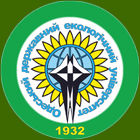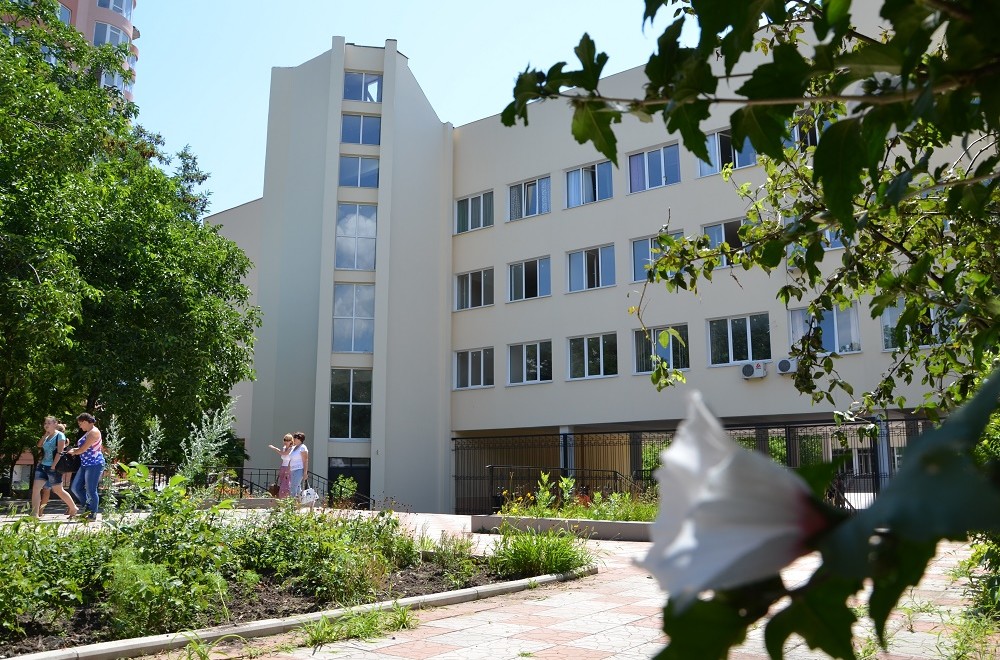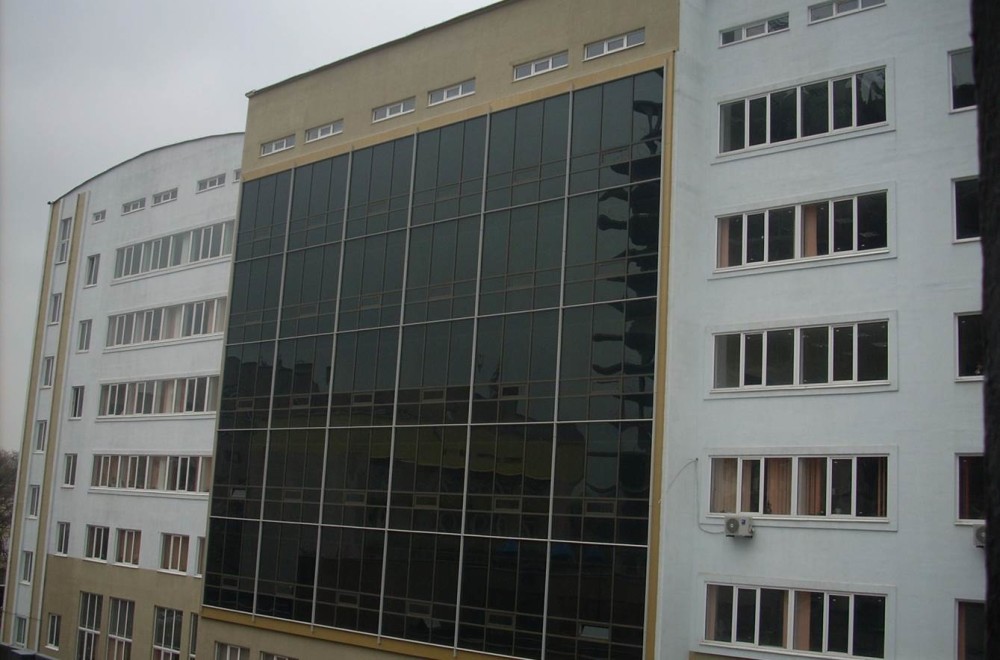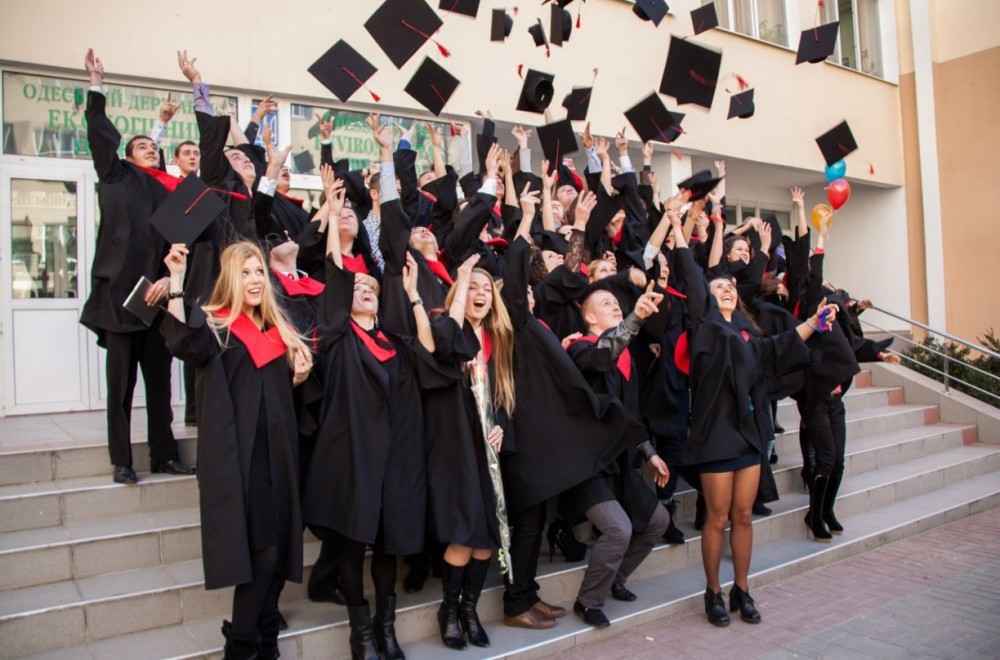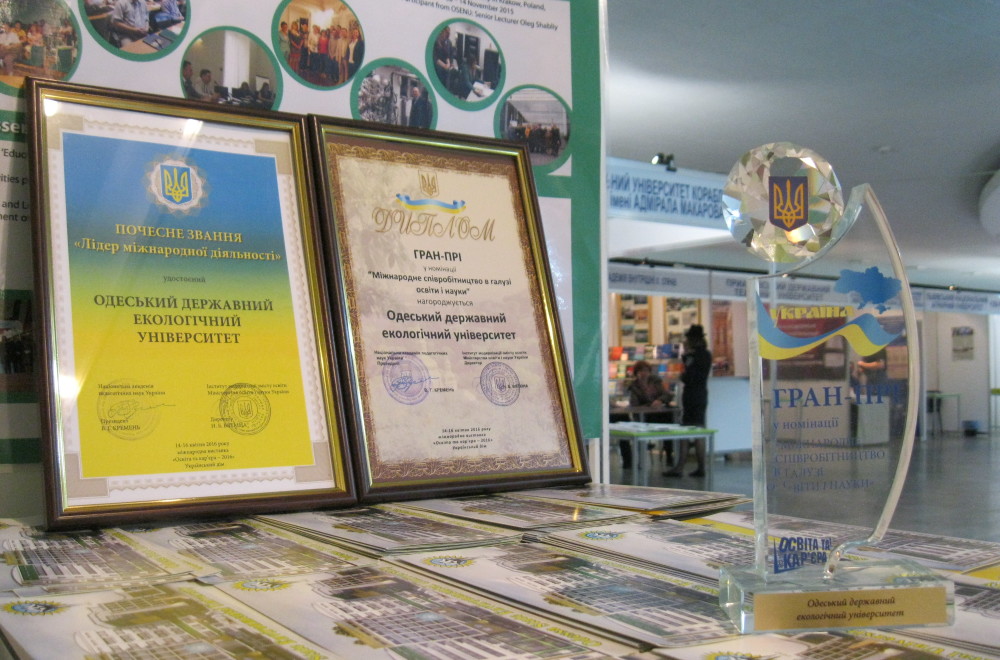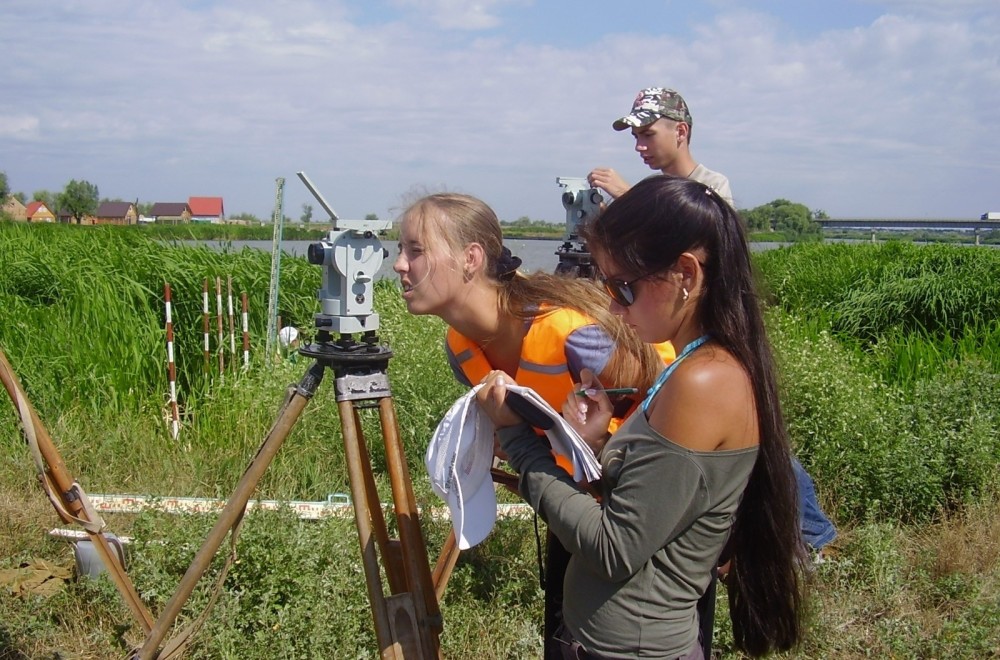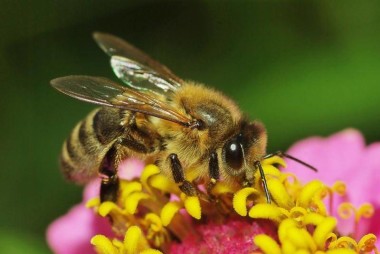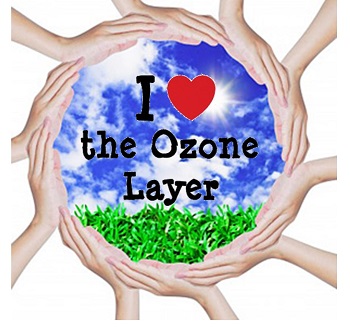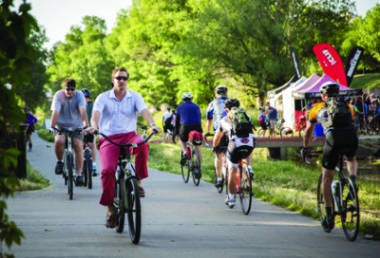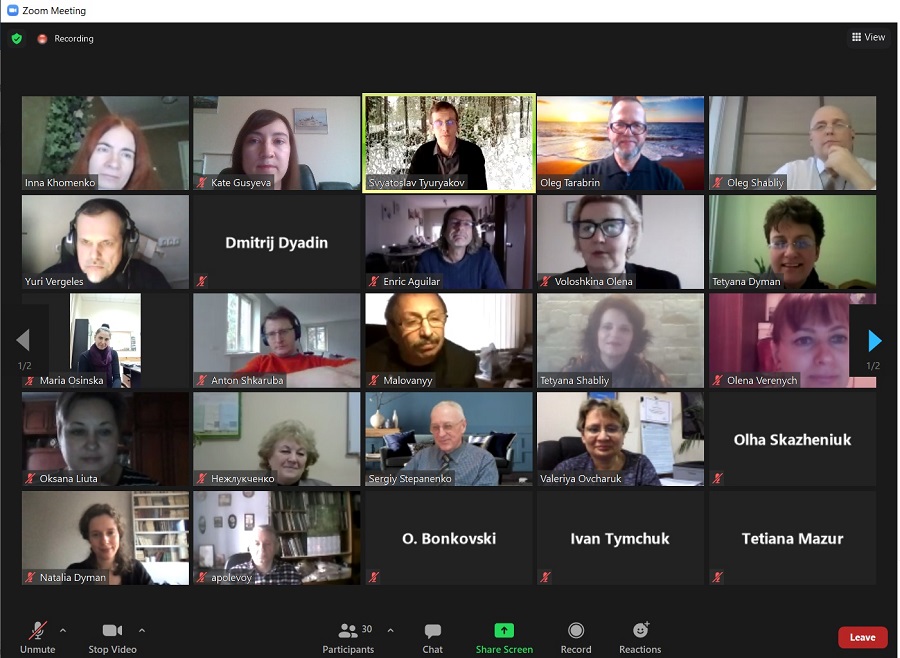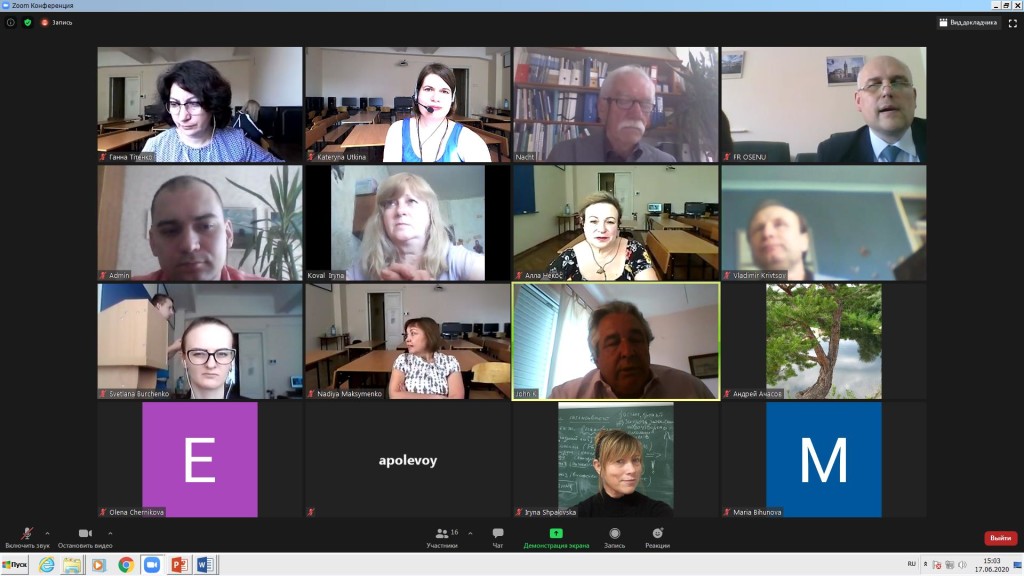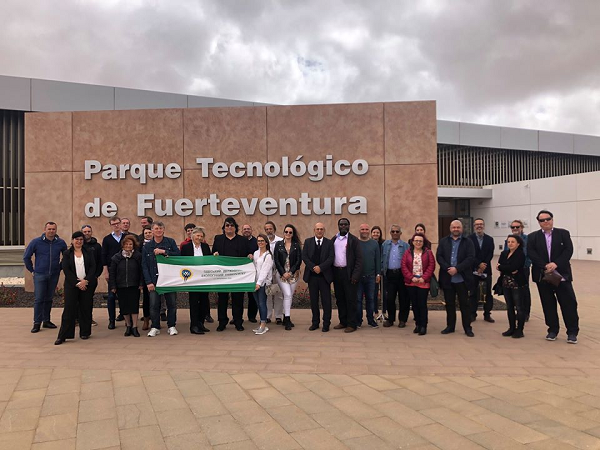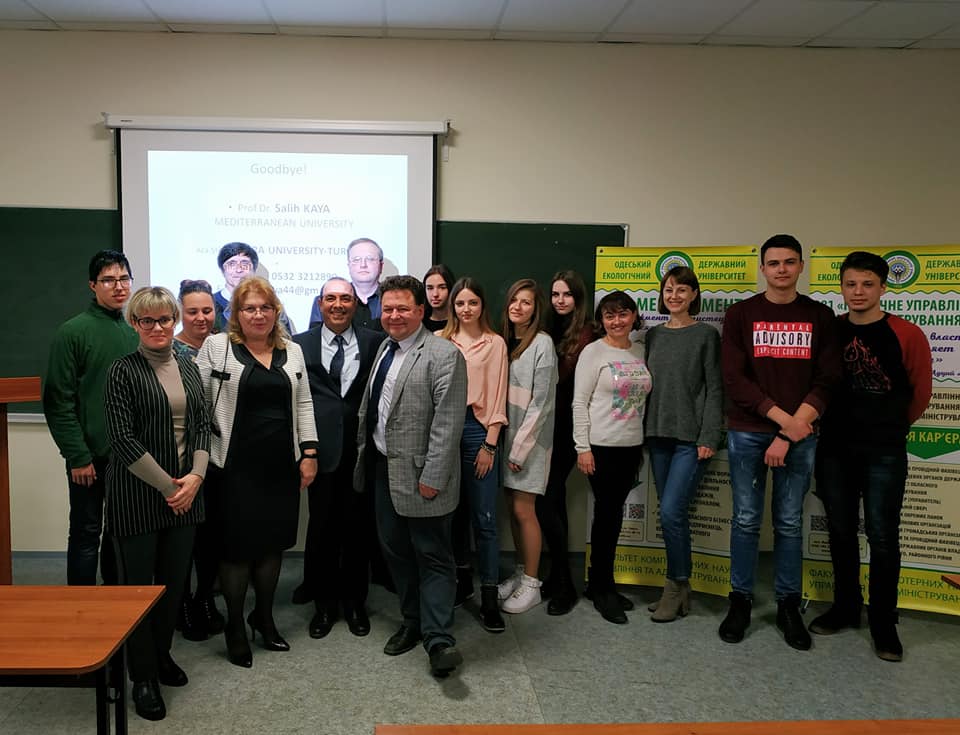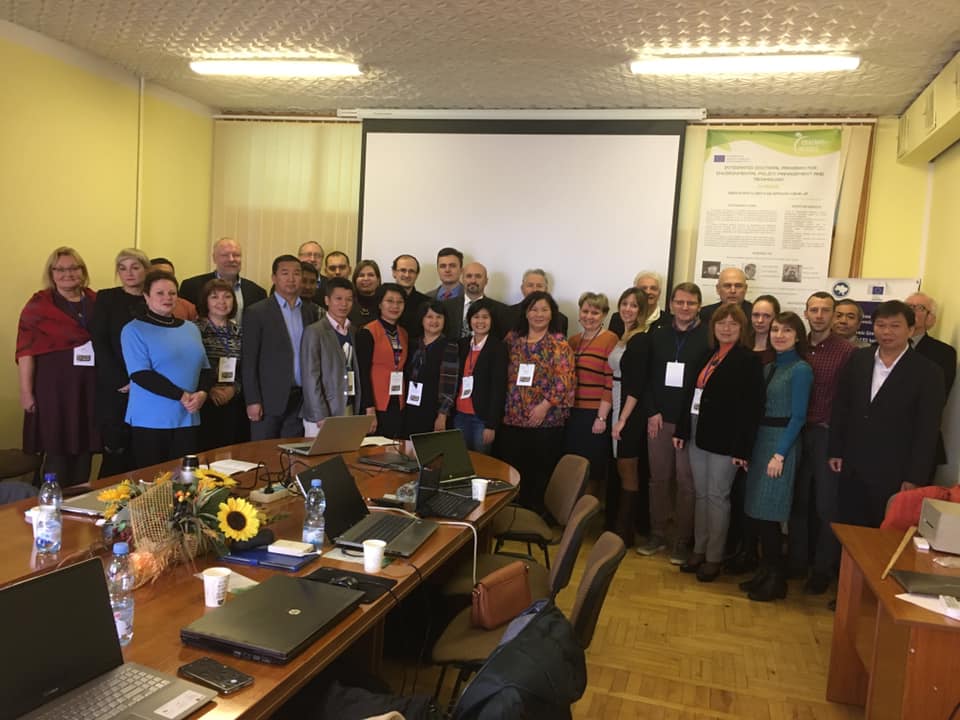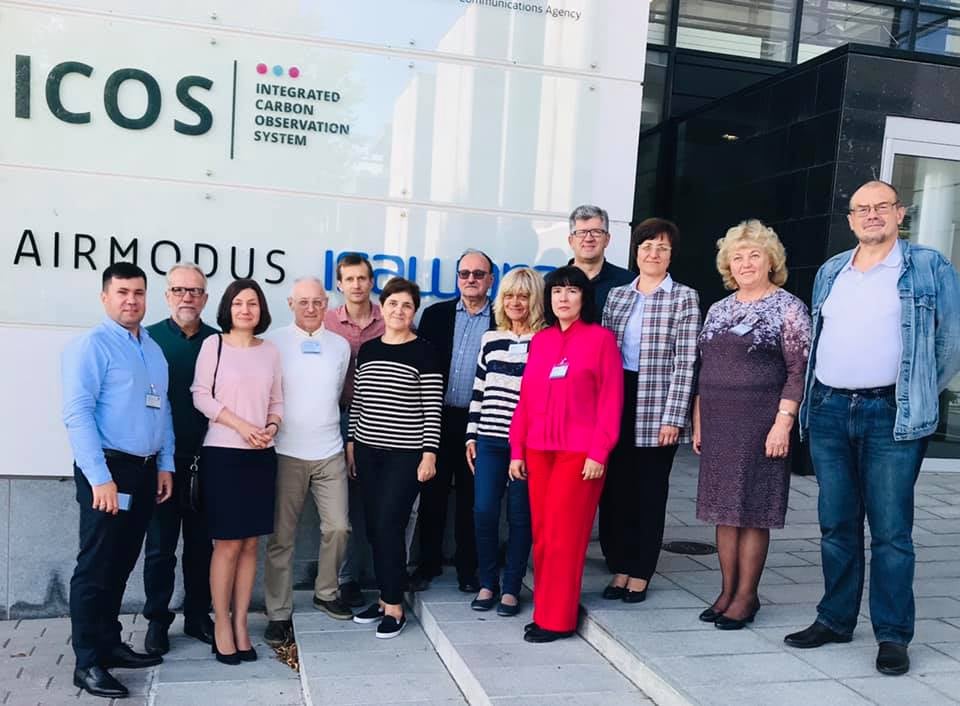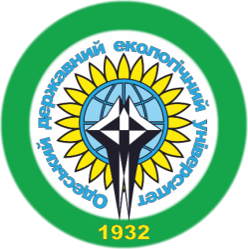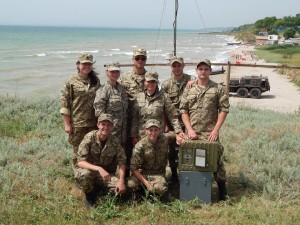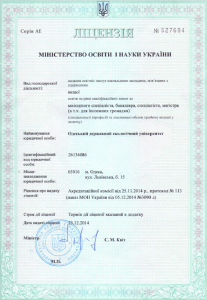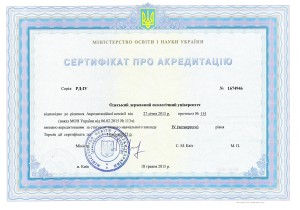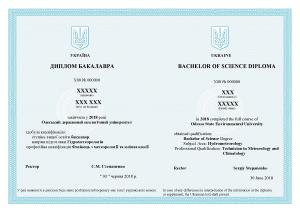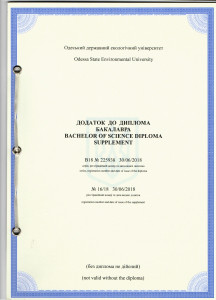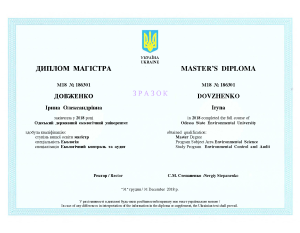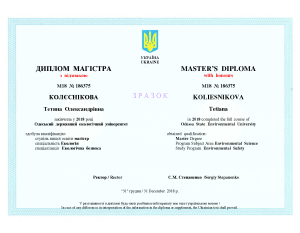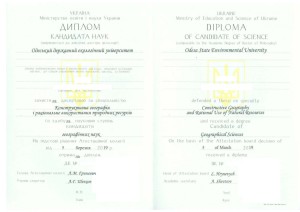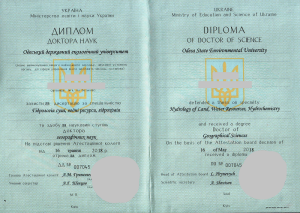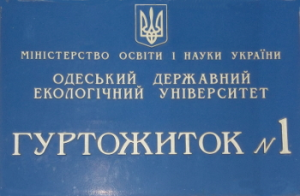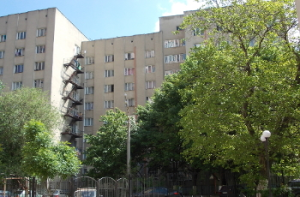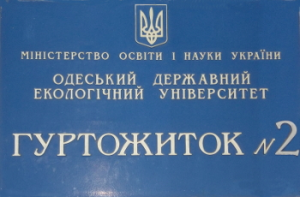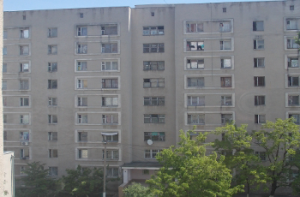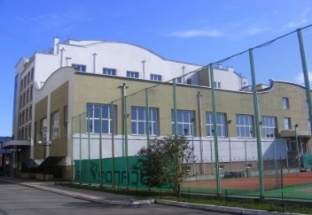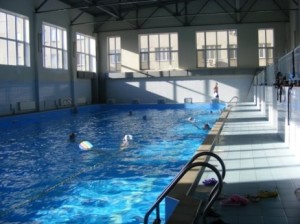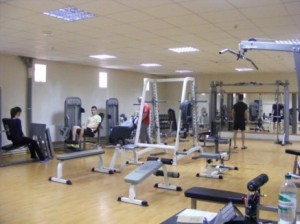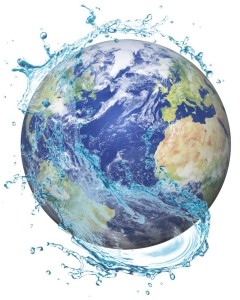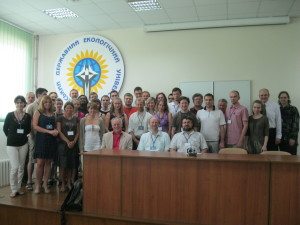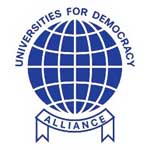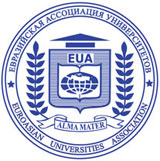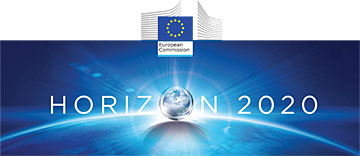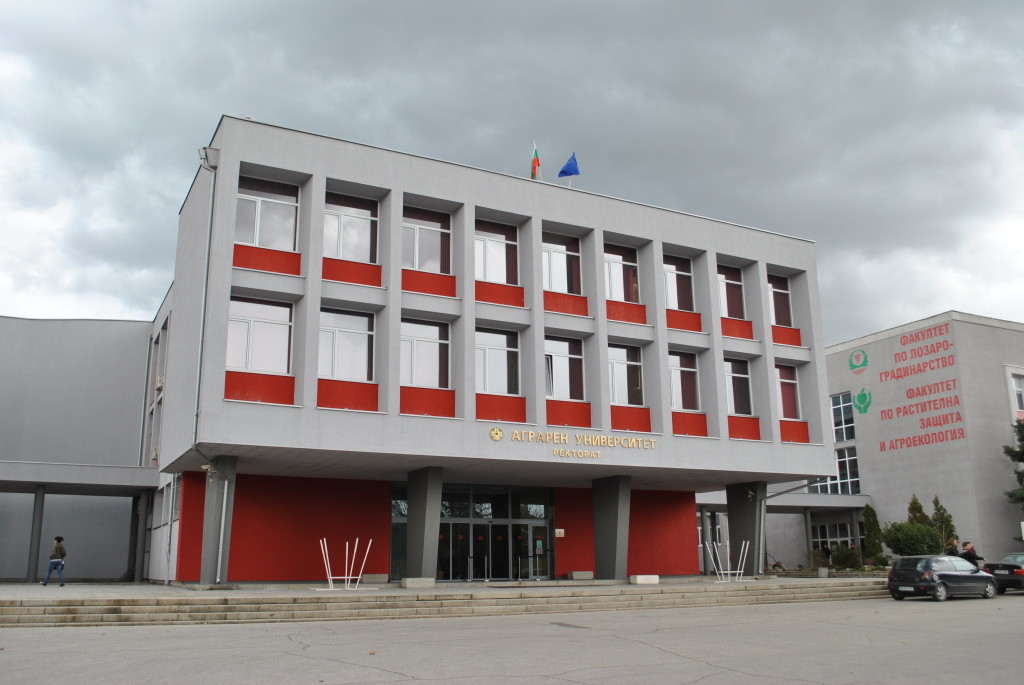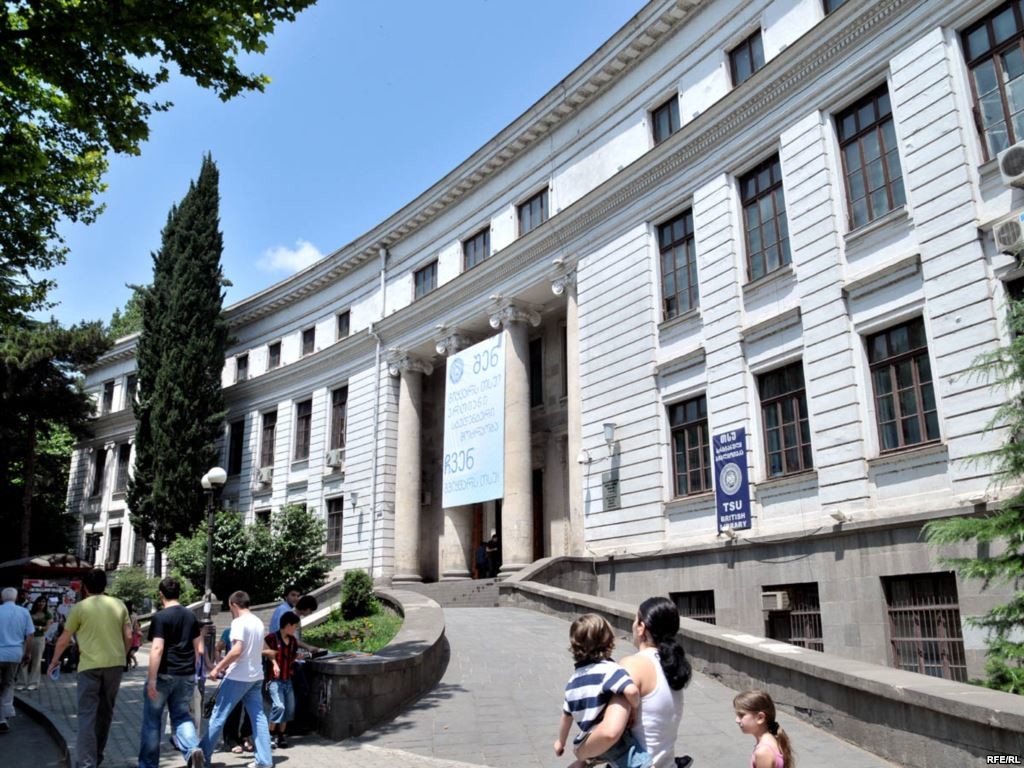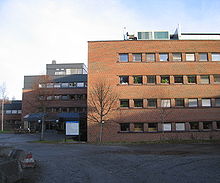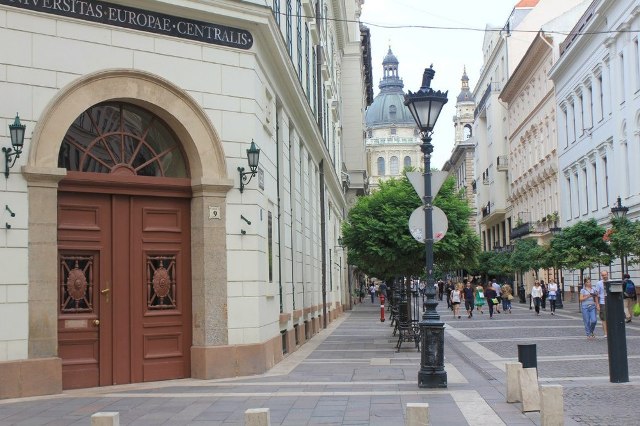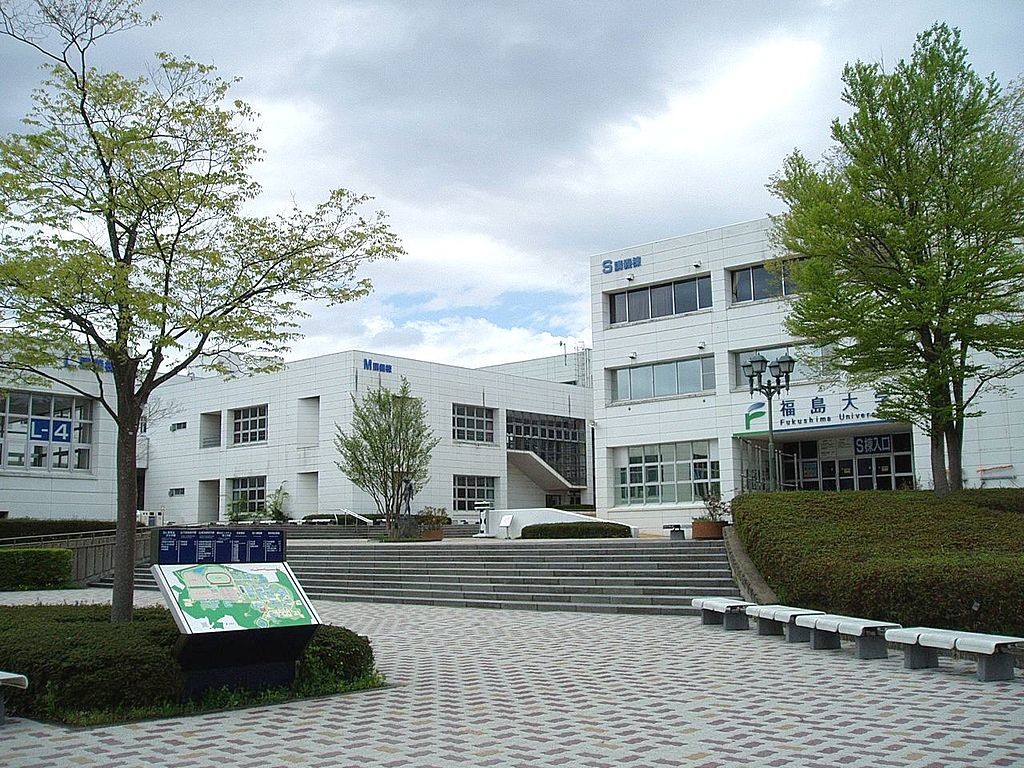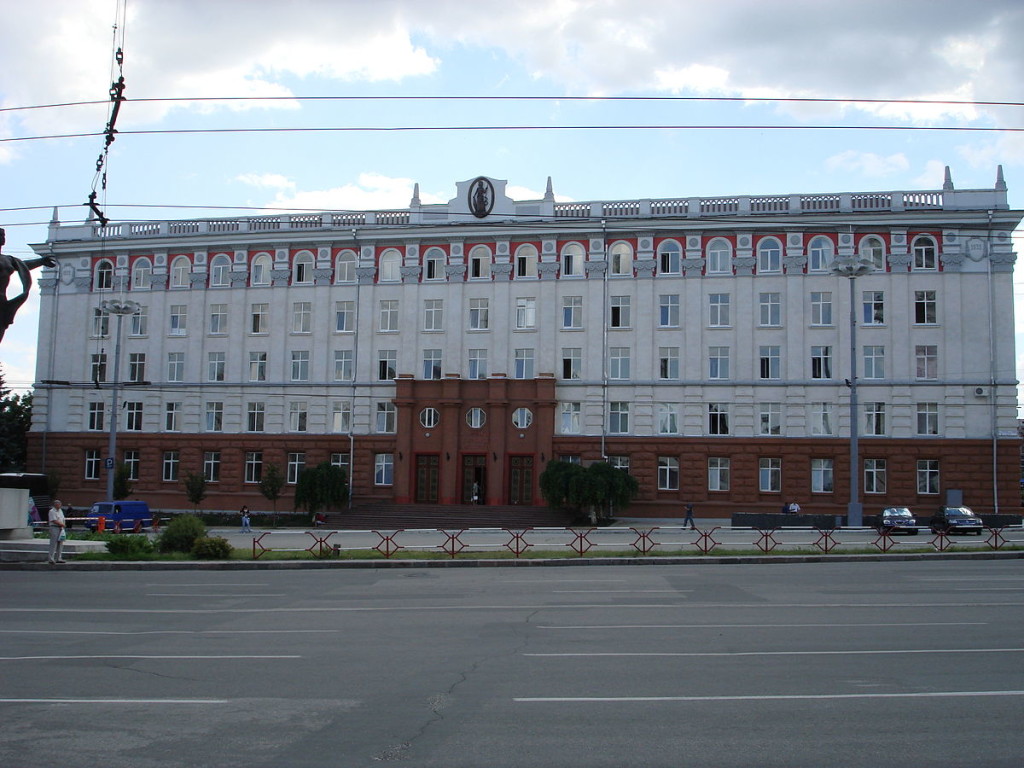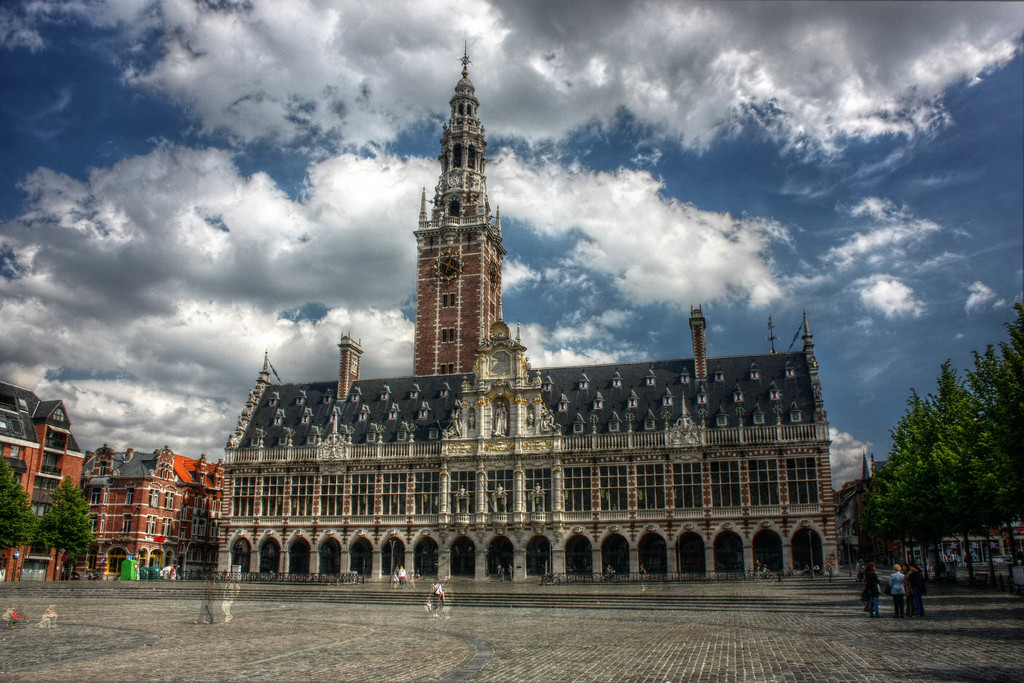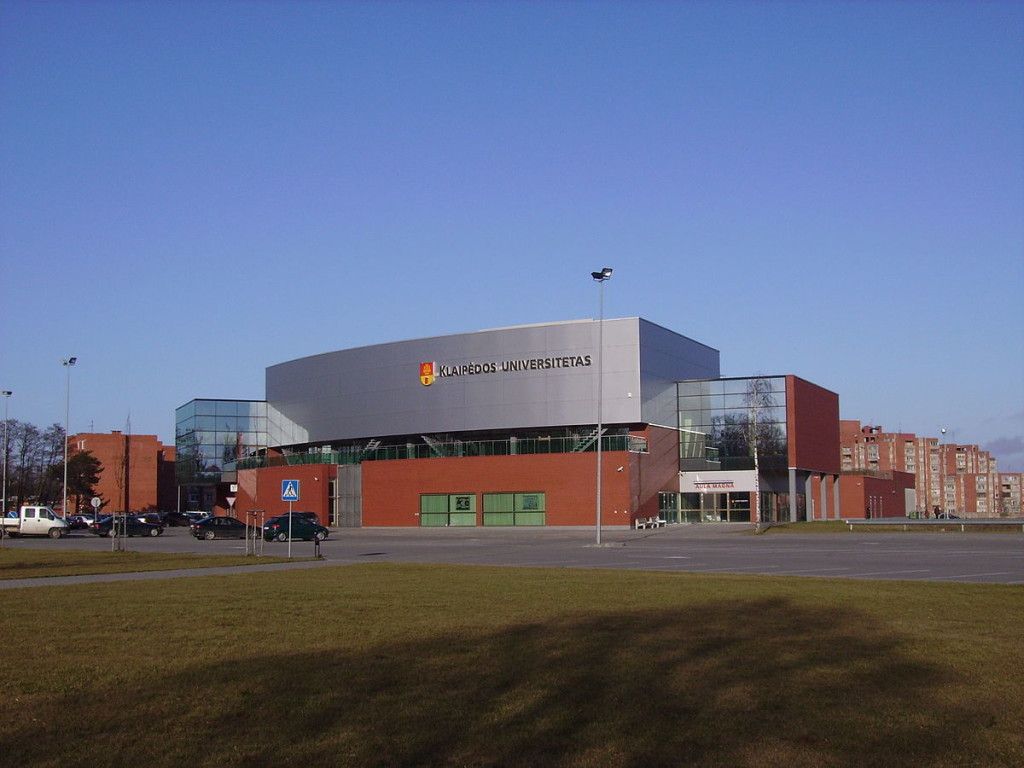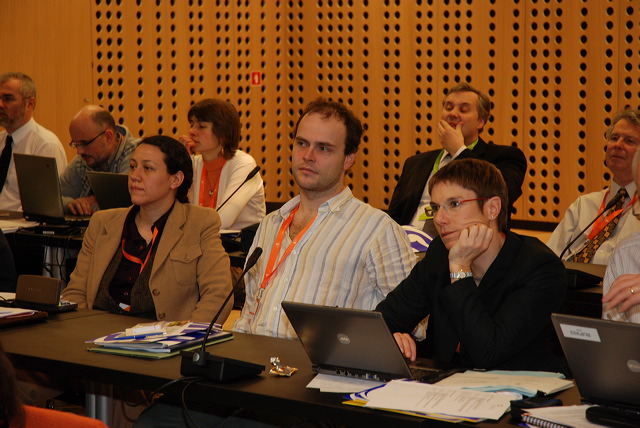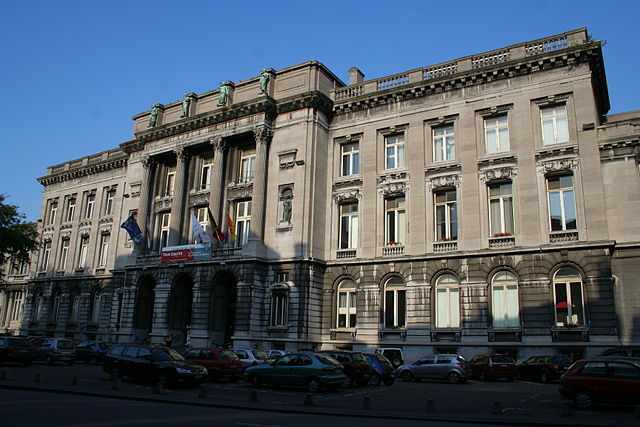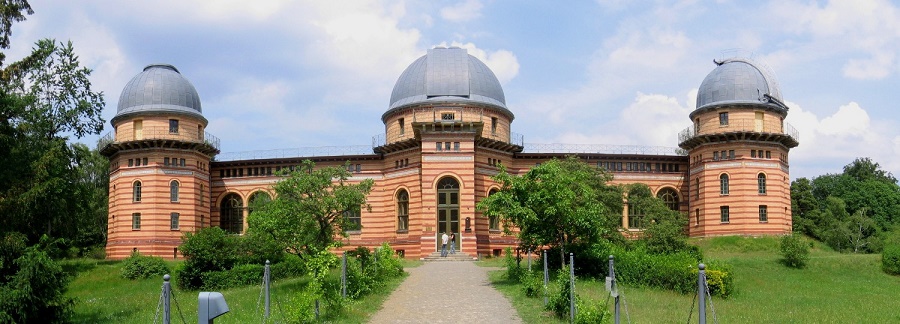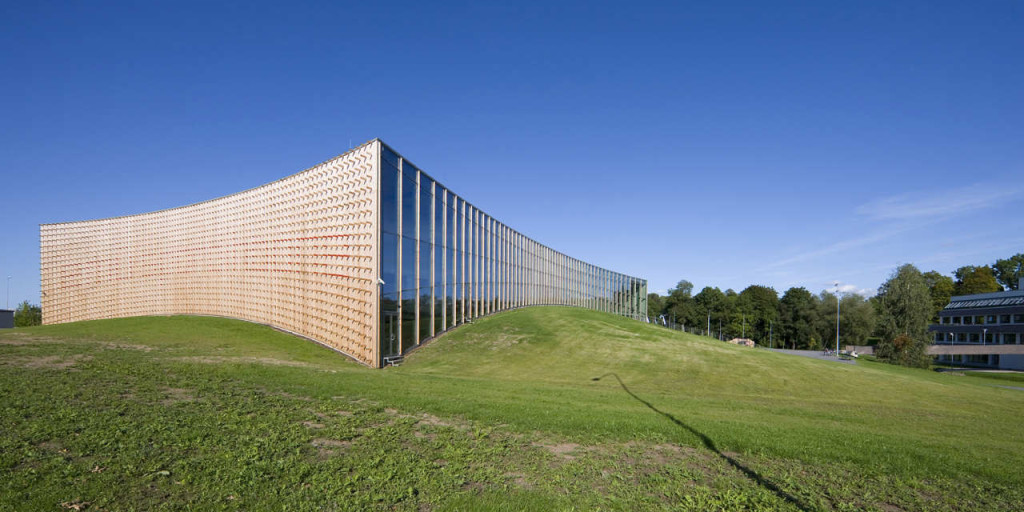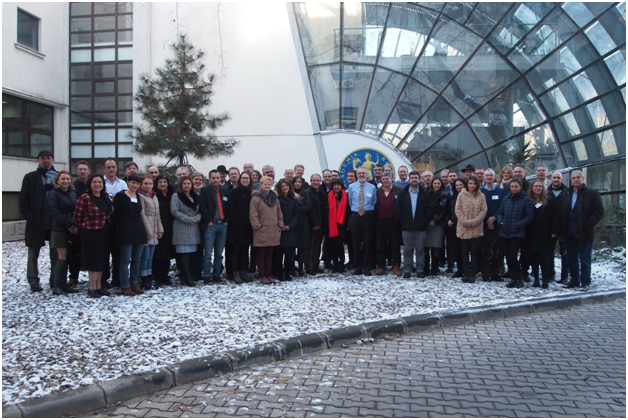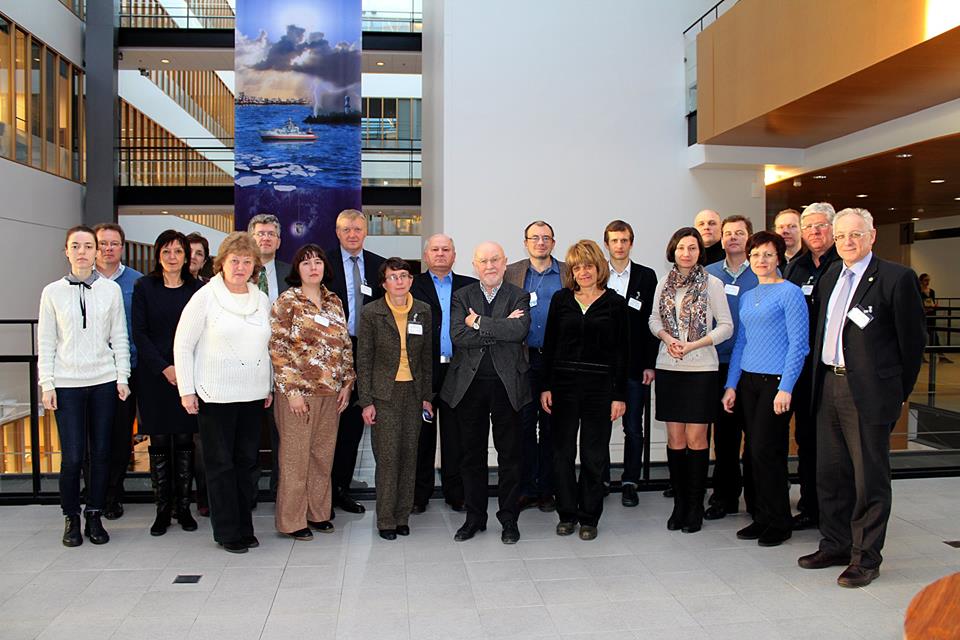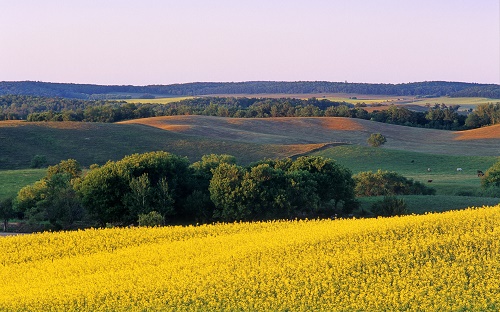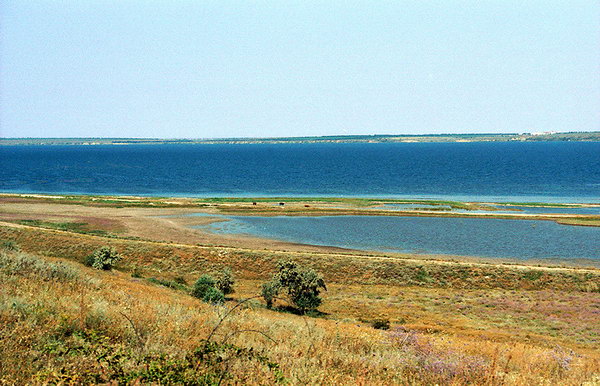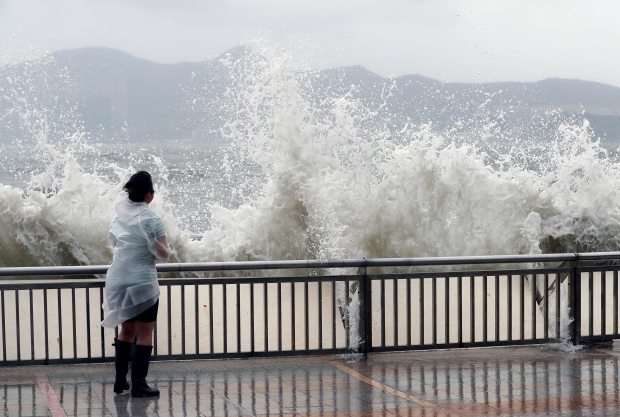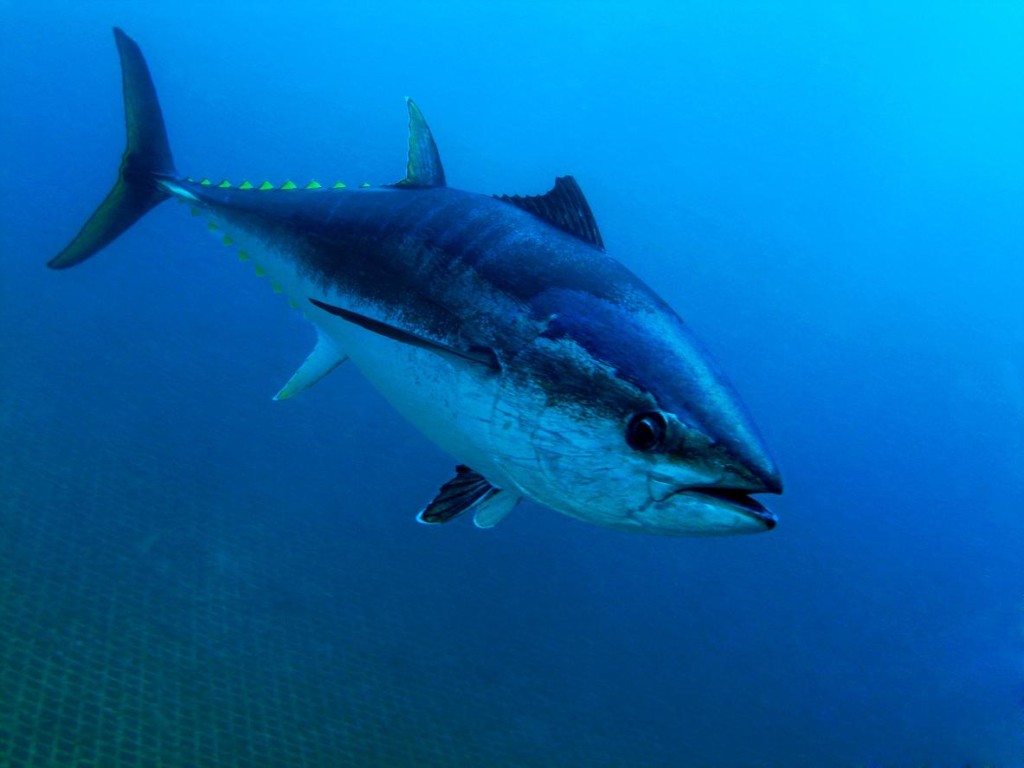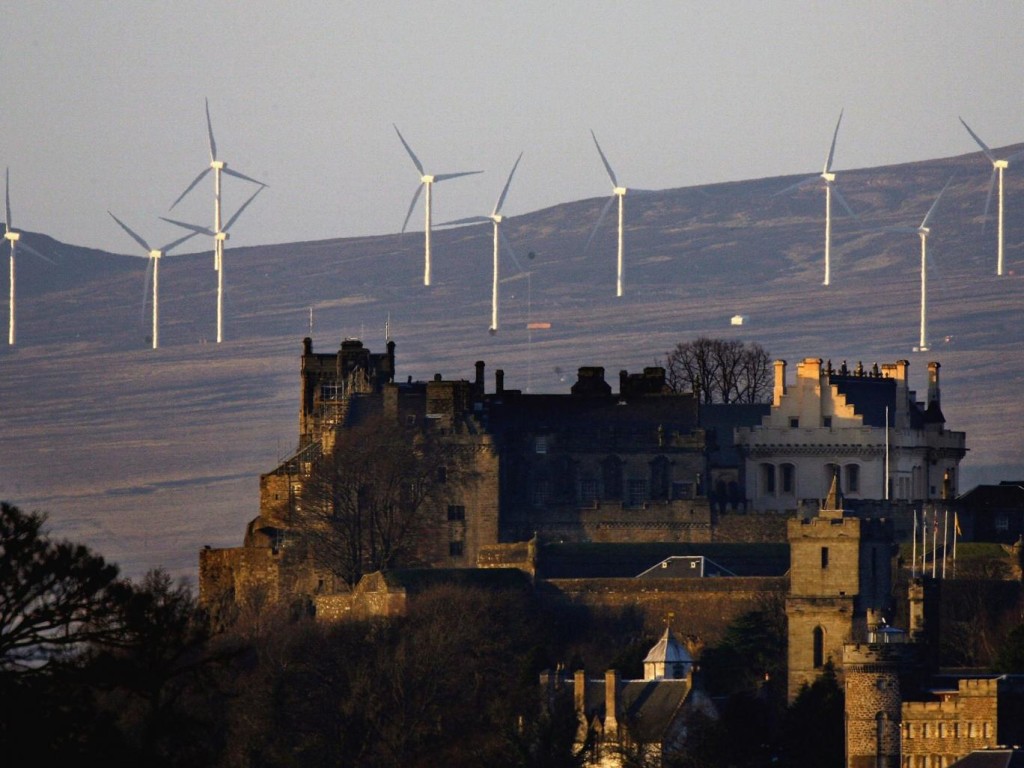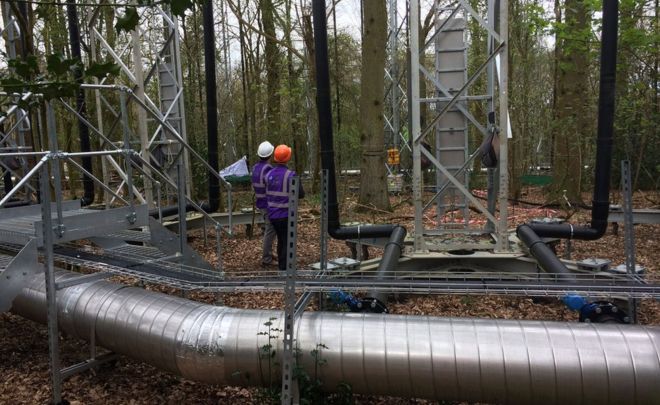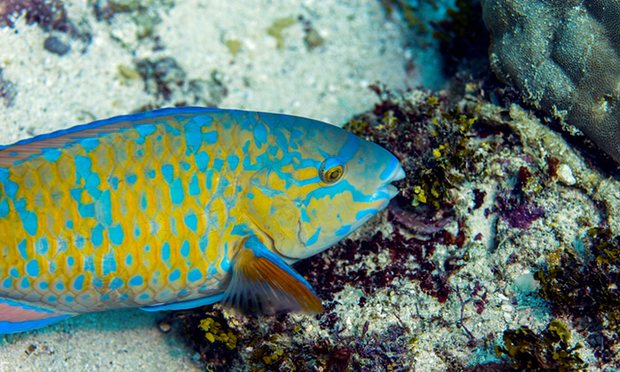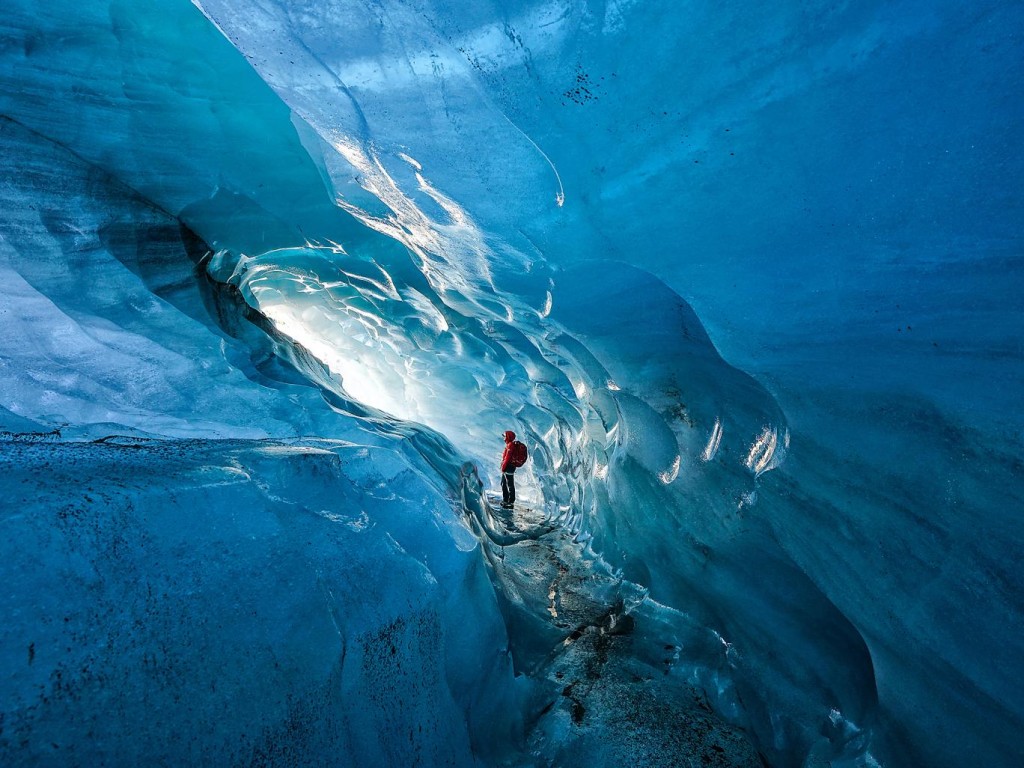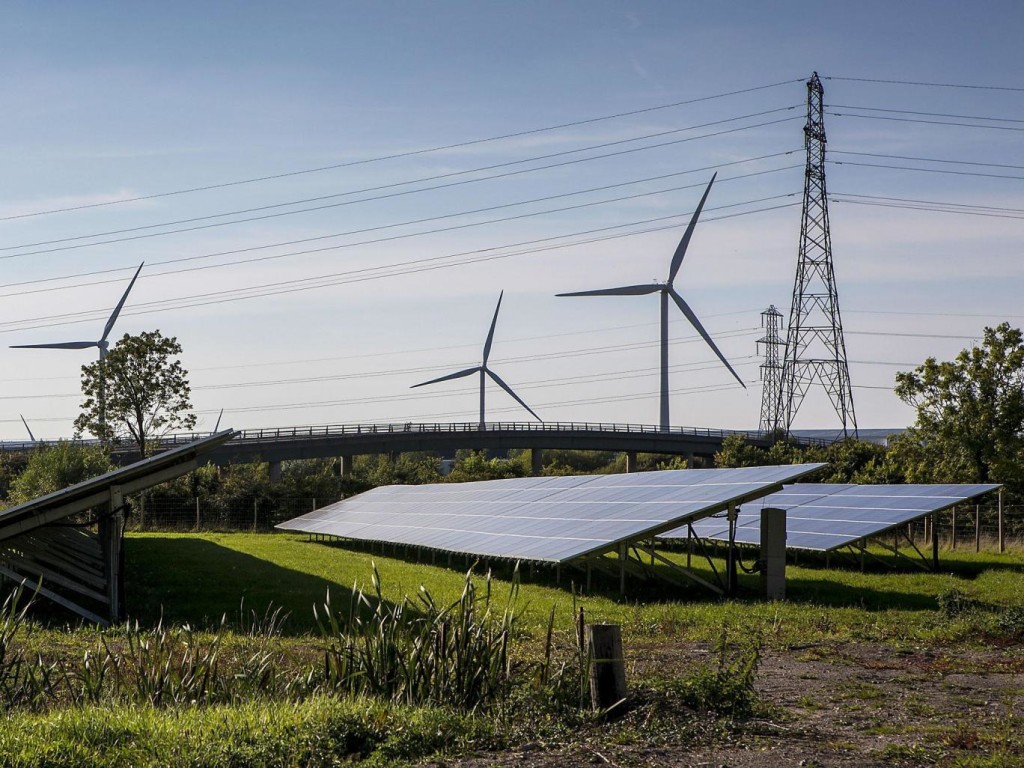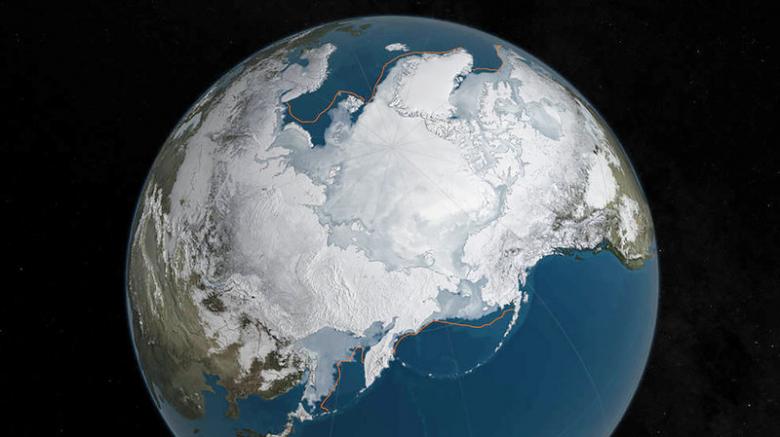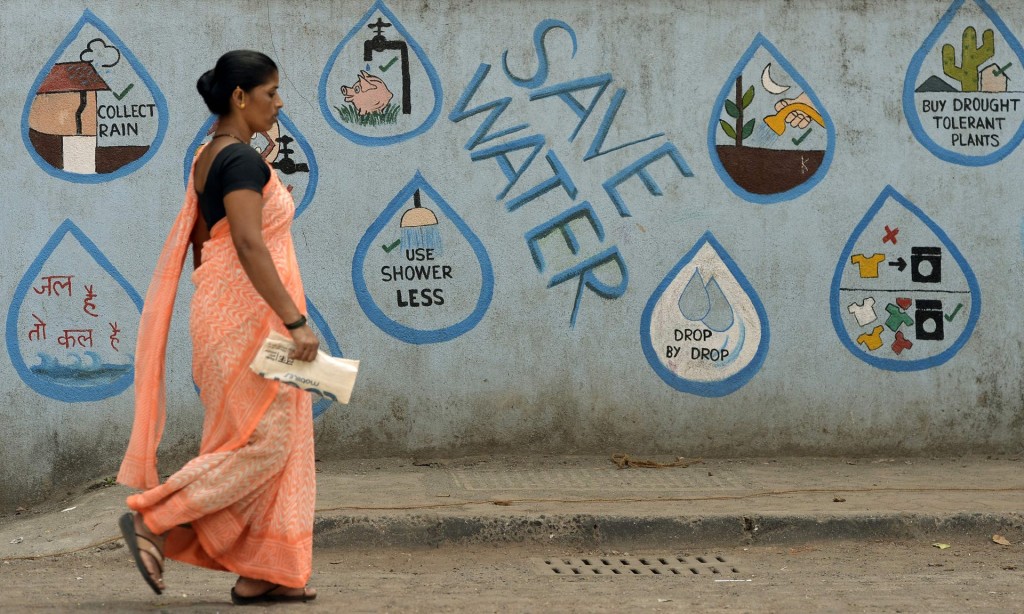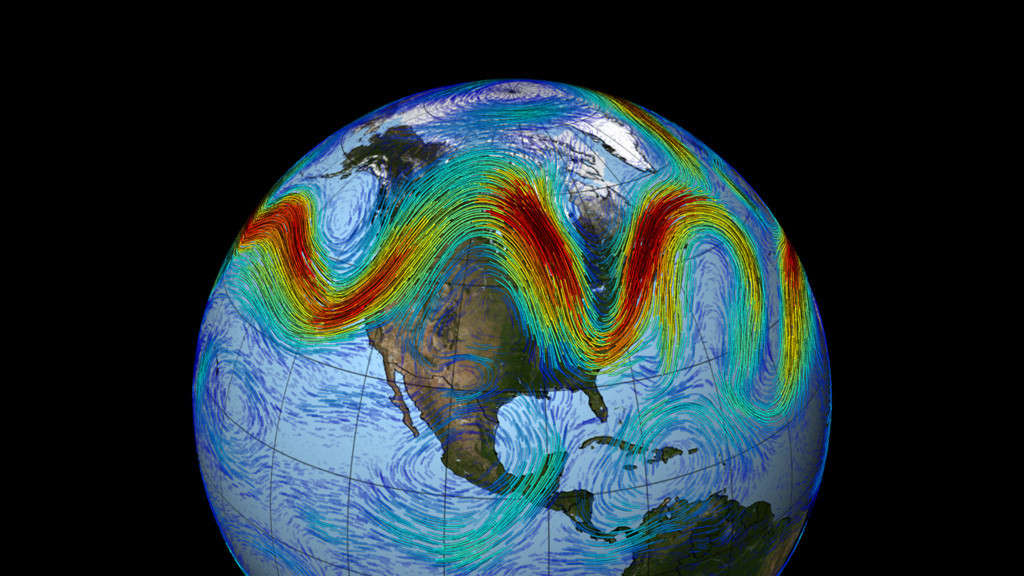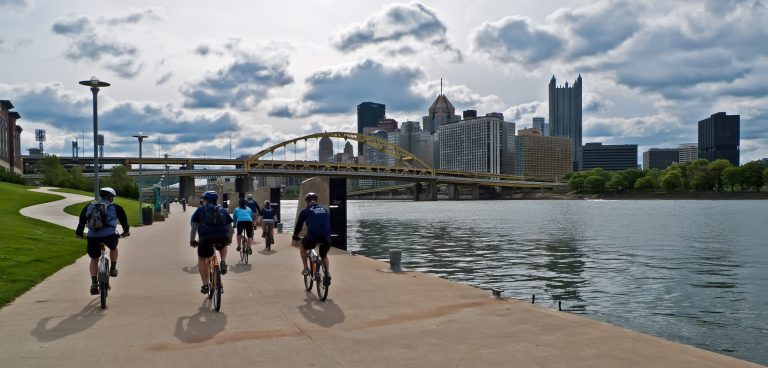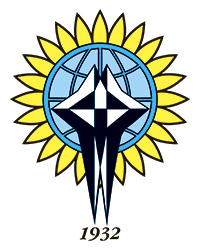
Odessa State Environmental University
Odessa State Environmental University has a glorious history, which dates back to 01 May 1932. Within this period, the University has become a unique institution of higher learning that provides quality higher education in accordance with the international standards in the extremely topical specialties related to protection, monitoring and forecasting the state of the natural environment. The essence of our mission is to change the outlook of our society and turn over the nature in which it is comforatable to live in to the generations-to-come. Join us in our work!
Sincerely,
Sergiy Stepanenko
Odessa State Environmental University (OSENU), a multi-campus public university, provides innovative undergraduate and graduate education that contributes to development of the society and the individual through harmonization of mankind-nature relations to facilitate learning through discovery, synthesis, preservation and dissemination of knowledge on the Environment.
Odessa State Environmental University is a multi-campus public university providing innovative undergraduate and graduate education that contributes to the development of society and the individual through harmonization of mankind-nature relations, the key national educational centre for training specialists in Environmental Science, Hydrometeorology, Management, Computer Science and Water Bio-Resources.
Odessa State Environmental University, a unique, Ukraine’s only institution of higher education of such specialization has made a significant contribution to the development of hydrometeorological and environmental science and practice in the former Soviet Union and other countries, has over the years trained and prepared many famous, worldwide acclaimed specialists in Conservation and Monitoring of the Environment, Hydrology, Meteorology, Agrometeorology, Climatology, Oceanography, Hydrography, etc. The high international level of training is confirmed by our students – citizens of dozens of countries in Europe, Asia, Africa and Latin America who successfully solve the problem of monitoring and protecting the environment, providing industries with high-quality information, including forecast of the state of the environment for life effective human activity. This is supported by hundreds of awards at international competitions, a high place in various Ukraine’s university activities rankings, active international cooperation with dozens of universities, educational and research organizations from dozens of countries.
Inscribed in the history of our institution are many famous names of its teachers and alumni. The University has good traditions and, with the years, acquired its unique appearance with the established well-known research schools, ample material resources, well-trained and professionally active teaching staff and researchers, whom any higher education institution in Ukraine could be proud of!
All these achievements are the result of the dedicated work of generations of lecturers, the staff and the alumni, which is why the words of thanks are to be said to all the generations of the past and everyone who works today! Bow and gratitude are for the life, the knowledge and the skills that are devoted to this University, the hard work and patient overcoming the difficulties that befell the Institution in its history!
Today’s transformations of the society and higher education bring about new requirements and challenges for the University. It is due to the call of the time that there emerged specialties related to modern computer technology, management of environmental protection, environmental audit, water bioresources etc. This higher educational establishment is proud of being able to create an effective training for the Armed Forces of Ukraine.
An integrated approach that presumes particular attention to the fundamental and the applied research, development of methodological complexes aimed at improvement of quality of the educational process and efficiency of the educational work gives fruitful results. Our graduates are competitive at the labour market not only in Ukraine but also in other countries and the specialties are claimed and relevant in terms of transformations in Ukraine’s economy, which will bring it closer to the EU standards.
The University staff constitute a national educational and research centre in the areas of Meteorology, Environmental Monitoring and Protection, the high mission of which is to work hard to change the outlook of our society in favour of one of the ecocentric nature and preserve the nature in which it is comfortable to live for the generations to come.
Odessa State Environmental University was founded on 1 May 1932 in Kharkiv as Kharkiv Engineering Hydrometeorological Institute. Since July 1944 the institution was moved to Odessa and renamed Odessa Hydrometeorological Institute (OHMI).
Comprehensive development of higher education, continuous improvement of educational and scientific processes and development of infrastructure was the basis for the Government of Ukraine to transform Odessa Hydrometeorological Institute into a University. On 9 August 2001 the Cabinet of Ministers of Ukraine created Odessa State Environmental University on the basis of OHMI.
Within the more than 85-year period of history of the University there developed two specific areas of training and research. On the one hand, historically, there developed a unique direction for Ukraine, related to training of engineering and research personnel in the field of Hydrometeorology and Monitoring of the Natural Environment. On the other hand, specific meteorological field of study provided for development of potent human resources, methodical and research basis for establishment of a University of Higher Environmental Education.
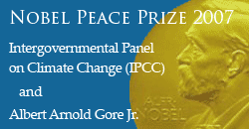 By the present time, Odessa State Environmental University has provided education for about 40,000 graduates, including about 2000 engineers, researchers, trainees, candidates and doctors for the 80 countries of the world, who have been trained since 1953. In the field of Hydrometeorology OSENU has been training specialists for the World Meteorological Organization for more than 50 years. The curricula for training specialists meet all international standards and are acknowledged by hydrometeorological services all over the world. Over 300 stall officers, the OSENU graduates, serve in the Armed Forces of Ukraine. Among the graduates there are many prominent scientists, researchers, environmental managers in the environmental and meteorological subdivisions of Ukraine, the CIS countries and many countries all around the world.
By the present time, Odessa State Environmental University has provided education for about 40,000 graduates, including about 2000 engineers, researchers, trainees, candidates and doctors for the 80 countries of the world, who have been trained since 1953. In the field of Hydrometeorology OSENU has been training specialists for the World Meteorological Organization for more than 50 years. The curricula for training specialists meet all international standards and are acknowledged by hydrometeorological services all over the world. Over 300 stall officers, the OSENU graduates, serve in the Armed Forces of Ukraine. Among the graduates there are many prominent scientists, researchers, environmental managers in the environmental and meteorological subdivisions of Ukraine, the CIS countries and many countries all around the world. 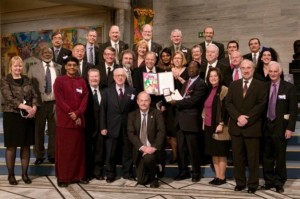 Two of OSENU graduates, members of Intergovernmental Panel on Climate Change, Alioune Ndiaye and Oleg Sirotenko were among the awarded the Nobel Peace Prize (2007).
Two of OSENU graduates, members of Intergovernmental Panel on Climate Change, Alioune Ndiaye and Oleg Sirotenko were among the awarded the Nobel Peace Prize (2007).
To support the study process, research and recreation of students there created good conditions such as modern educational, scientific and social infrastructure (canteen, sports hall and dormitories) of the University in the territory of a single campus in the resort district of Odessa. Since 2007, the University has put into operation a modern sports complex with a swimming pool, numerous game rooms, sports fields and pitches, a shooting range and tennis courts.
Training, including the second higher education, full-time and distance learning is provided in ten specialties of higher education at the levels of Bachelor, Master and PhD:
- Economics
- Management
- Law
- Environmental Science
- Earth Sciences
- Computer Sciences and Information Technology
- Environmental Protection Technologies
- Water Bioresources and Aquiculture
- Tourism
- Public Management and Administration
Since 1992 Odessa State Environmental University has trained regular hydrometeorology officers, who provide the military units of the Air Force, the Army, the Missile Troops, the Artillery and Navy of Ukraine with meteorological and geophysical data.
In the field of ‘Hydrometeorology’, specializations (Curricula) of which are included in the specialty 103 ‘Earth Sciences’, OSENU has been training specialists for the World Meteorological Organization, a specialized agency of the UNO, for more than 70 years.
At Odessa State Environmental University, there provided Doctorate and Post-Graduate studies, and there operate three specialized Academic Councils for defence of doctoral and PhD theses in five research areas.
The Centre for Continuing Studies of the University offers some thirty-five programs of short- and medium syllabi (30 to 150 academic hours) for Professional Development in title specialities and specializations for professionals from various regional organizations and services, businesses, teaching staff of other universities and the community.
Currently, about 200 research and teaching staff are employed at 21 departments of the University. More than 2/3 of them hold a PhD or a DSc degree, 15 OSENU Professors and researchers are Academicians and Corresponding Members of various academies of Ukraine, the CIS countries, the European Union and the United States.
Nowadays, undergraduate, Master, PhD and doctoral students from 15 countries are enrolled at OSENU. The University actively cooperates with the specialized UN agency, the World Meteorological Organization, in the framework of voluntary assistance programme (PDS WMO), many universities of the CIS countries, Europe, North America and other regions.
In recent years the OSENU staff was repeatedly rewarded diplomas and awards of the Government, including Honorary Diplomas of the Cabinet of Ministers of Ukraine, the Ministry of Education and Science of Ukraine, the Ministry of Emergency Situations of Ukraine, the Ministry of Ecology and Natural Resources of Ukraine, the Ministry of Defence of Ukraine, other ministries and departments. The University staff became the winner of the Contest ‘Golden Trade Marks’ (2009), the International Academic Rating ‘Golden Fortune’ (2010), the Contest in ‘Ecology, Environment and Natural Resources in Ukraine’ (2011), the ‘Quality of Scientific Publications’ contest (2014). OSENU is declared a leader of the national system of university rating (certificate of the Ministry of Education and Science of Ukraine (2012), ‘The Leader of Scientific and Technical Activity’ (2013), ‘The Leader of International Activity’ (2016, 2017, 2018), awarded the Grand Prix at the international contests in Education (2010-2013 and 2015-2018), the Silver Medal ’10 Years of Independence of Ukraine’ and the ‘Public Acclaim’ insignia.
It is on the basis of the Department of Agricultural Meteorology and Agrometeorological Forecasting and the Department of Applied Environmental Science, a Coordination Center for Training and Retraining of Specialists in Agricultural Meteorology, Agroecology and Climate Change from the CIS countries (a Center of Excellence, www.coe.osenu.org.ua ) is established by the decision of International Coordination Meeting within the framework of the ‘Development of Qualification Framework in Meteorology’, QualiMet, 159352-TEMPUS-FI-TEMPUS-JPHES, www.qualimet.osenu.org.ua), 8 June 2012, Rome (Italy), as a result of the joint actions of the partners under ‘EU Based Course in Foodstuff Expertise & Quality Control’, EUBCFEQC, 159173-TEMPUS-DE-TEMPUS-JPCR, www.foodstuff.osenu.org.ua, and ‘Environmental Governance for Environmental Curricula’, EnGo, 511390-TEMPUS-1-2010-1-SK-TEMPUS-JPCR, www.engo.osenu.org.ua) projects and with the decisions of the 24th Session of the Intergovernmental Council on Hydrometeorology of the CIS countries, 4-5 October, 2012, Kazan, taken account of.
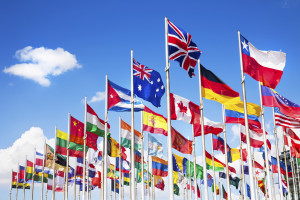 In 2011-2014 OSENU participated in the project consortium on Enhanced three-level competency-based curricula in Applied Marine Science, e-Maris, 517271-TEMPUS-1-2011-1-DE-TEMPUS-JPCR, www.emaris.net, involving academic and research institutions from Germany, Russia, Lithuania and Spain.
In 2011-2014 OSENU participated in the project consortium on Enhanced three-level competency-based curricula in Applied Marine Science, e-Maris, 517271-TEMPUS-1-2011-1-DE-TEMPUS-JPCR, www.emaris.net, involving academic and research institutions from Germany, Russia, Lithuania and Spain.
Since December 2013 OSENU has been involved in implementation of ‘Qualifications Frameworks for Environmental Science at Ukrainian Universities’, QANTUS, 544524-TEMPUS-1-2013-1-PL-TEMPUS-SMHES, www.qantus.osenu.org.ua, project in partnership with universities and organizations from Austria, Belgium, Germany, Italy, Poland and Spain. The project is aimed at enhancement of quality and relevance of higher education in Ukraine and increasing convergence with EU developments through elaboration of qualifications frameworks.
In October 2015 a project on Adaptive learning environment for competence in economic and societal impacts of local weather, air quality and climate, ECOIMPACT, 561975-EPP-1-2015-1-FI-EPPKA2-CBHE-JP, under new ERASMUS+ programme was launched. The project, which is coordinated by the University of Helsinki, Finland, with participation of OSENU and EU partners from Slovakia and Bulgaria, is aimed at building capacity for improvement of the educational level of society towards more resilient social and economic development.
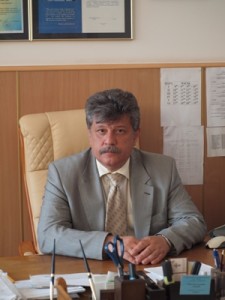
Vice-Rector for Studies:
Mykola Serbov
E-mail: serbov@odeku.edu.ua
Phone: +38 0482 326 764
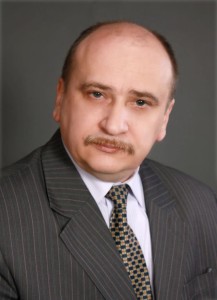
Vice-Rector for Research:
Yuriy Tuchkovenko
E-mail: science@odeku.edu.ua
Phone: +38 0482 357 371
Vice-Rector for Study Methodology and Techniques: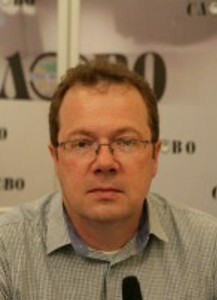
Valerii Khokhlov
E-mail: metod1@odeku.edu.ua
Phone: +38 0482 326 762
Vice-Rector for Administrative Activity:
Mariia Krachkovska
E-mail: social@odeku.edu.ua
Phone: +38 0482 427 766
OSENU is a powerful academic, training and scientific centre which consists of the Hydrometeorological Institute, the Nature Protection Faculty, the Faculty of Computer Science, Management and Administration, The Faculty of Master Training, Sub-faculty of Military Training, the Department of Post-Graduate and Doctoral Training, the Training and Consultancy Centre of Distance Learning, the Centre for Continuing Studies, the Preparatory Department, the Dean’s Office for the Work with Foreign Students, the Department of Foreign Relations, Kherson and Kharkiv technical schools of Hydrometeorology, research laboratories for advanced study of the Antarctica, of atmospheric air pollution, nuclear and radiation safety, physics of compound systems and the environment that provides a wide range of unique educational programmes in the fields of Environmental and Earth Sciences.
The number of academic staff:
- a) full-time: 222
- b) part-time: 58
- c) current number of academic staff holding a doctorate: 31 (Doctor of Science), 125 (Candidate of Science/PhD)
Hydrometeorological Institute
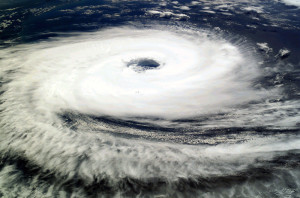 Training is provided in the field of Meteorology, Agrometeorology, Hydrology, Oceanology, Hydrography.
Training is provided in the field of Meteorology, Agrometeorology, Hydrology, Oceanology, Hydrography.
Within the domain of Meteorology as a speciality there exist the following specializations: Weather Forecasting (Metcasting), Aeronautical Meteorology, Radiometorology and Radiolocation.
Since 1999 the department has provided training for the students in the field of Polar Meteorology.
Since 2013 admission to the specialities of Atmospheric Geophysics and Climatology is planned.
From the third year of study on the students of Hydrology are given the opportunity to specialize in Complex Water Management, Water Conservation and Institutional Basics of Water Industry
Tel: +38 0482 425 717
e-mail: dean-gid@odeku.edu.ua
Nature Protection Faculty
Provides training of researchers, experts, inspectors for organisations and offices engaged in environmental control, activity of scientific-research centres, manufacturing enterprises, regional departments of environmental control and regional government administrations. Students of such specialisations as Environmental Management, Environmental Aspects of Recreational and Health Resort Economy, Hydroecology, Radioecology, Environmental Aspects of Fish Industry are given training at the faculty.
Tel.: +38 0482 425 718
e-mail: dean-priroda@odeku.edu.ua
Faculty of Computer Science, Management and Administration
 Provides training of specialists in the field of Computer Science, Management and Administration to work up and develop components of data processing and project management systems, specific software and geoinformation systems. Provides training of officers for legal and economic departments of the organisations engaged in developing and planning activities in the field of environmental monitoring and control, sustainable nature management, state regional departments of environmental safety, environmental inspectorates as well as experts in nature-conservative activities for enterprises in both public and private sectors of national economy.
Provides training of specialists in the field of Computer Science, Management and Administration to work up and develop components of data processing and project management systems, specific software and geoinformation systems. Provides training of officers for legal and economic departments of the organisations engaged in developing and planning activities in the field of environmental monitoring and control, sustainable nature management, state regional departments of environmental safety, environmental inspectorates as well as experts in nature-conservative activities for enterprises in both public and private sectors of national economy.
Tel: +38 0482 326 75
e-mail: dean-comp@odeku.edu.ua
Faculty of Master Training
 At present, the students of the faculty study at the master level in 23 specialities. The Dean’s Office coordinates the students’ research work and activities of the scientific community of MSc and PhD students at OSENU, conducting of the annual OSENU students’ scientific conference, the All-Ukrainian scientific conference for undergraduate and postgraduate students on ‘Current State and Quality of the Environment in Particular Regions’, the annual scientific conference for OSENU young scientists, the all-Ukrainian student contest in Environmental Science. The faculty consists of the departments of: Foreign Languages, Higher and Applied Mathematics, General and Theoretical Physics, and Physical Education.
At present, the students of the faculty study at the master level in 23 specialities. The Dean’s Office coordinates the students’ research work and activities of the scientific community of MSc and PhD students at OSENU, conducting of the annual OSENU students’ scientific conference, the All-Ukrainian scientific conference for undergraduate and postgraduate students on ‘Current State and Quality of the Environment in Particular Regions’, the annual scientific conference for OSENU young scientists, the all-Ukrainian student contest in Environmental Science. The faculty consists of the departments of: Foreign Languages, Higher and Applied Mathematics, General and Theoretical Physics, and Physical Education.
Tel: +38 0482 326 758
e-mail: magistr@odeku.edu.ua
Sub-faculty of Military Training
A programme for training of regular hydrometeorology officers for the Ukrainian Army, Navy and Air Force has been carried out at the Sub-faculty of Military Training. The students who are given training in civil specialities at the University are provided Senior Division Programme.
Tel: +38 0482 326 743
e-mail: mil-meteo@odeku.edu.ua
Regional branches:
Kharkiv Technical College of Hydrometeorology,
Kherson Technical College of Hydrometeorology,
Odessa College of Computer Science.
OSENU Licenses
OSENU License as of 04 July 2017
OSENU License as of 05 July 2017
Certificates (Bachelor of Science)
6.040106 Environmental Science, Environmental Protection and Sustainable Nature Management
6.090201 Water Bioresources and Aquaculture
074 Public Management and Administration
122 Computer Sciences and Information Technology
183 Environmental Protection Technologies
281 Public Management and Administration
Certificates (Master of Science)
8.03060101 Management of Organizations and Administration
8.03060103 Environmental Management
8.04010601 Environmental Science and Environmental Protection
8.04010602 Applied Environmental Science and Sustainable Nature Management
8.04010603 Environmental Safety
8.04010604 Environmental Control and Audit
8.04010606 Nature Reserve Business
8.05010101 Information Control Systems and Technologies
8.05010105 Environmental-and-Economic Computer Monitoring
8.18010017 Economics of the Environment and Natural Resources
074 Public Management and Administration
122 Computer Sciences and Information Technology
Principal graduate and post graduate qualifications awarded and period of study normally required for each, number of student for each category of qualification.
Bachelor of Science (4 years of the Undergraduate Studies), 1350 students
Master of Science (1 year 4 months under professional programme / 1 year 9 months under research programme, upon the completion of the Baccalaureate Course), 150 students
Doctor of Philosophy Post Graduate Study (4 years, upon completion of the Master Course), Defence of a Candidate Thesis, 55 students
Doctor of Science Doctorate Study, (2 years) Defence of a Doctoral Thesis, 2 students
Examples of diplomas / degrees certificates:
Bachelor Diploma
Master Diploma
Doctor of Philosophy Diploma
Doctor of Science Diploma
BSc Programmes
- 073. Management
- 074. Public Management and Administration
- 101. Environmental Science
- 103. Earth Sciences
- 122. Computer Sciences and Information Technologies
- 183. Environmental Protection Technologies
- 207. Water Bioresources and Aquiculture
- 242. Tourism
MSc Programmes
- 051. Economics
- 073. Management
- 074. Public Management and Administration
- 081. Law
- 101. Environmental Science
- 103. Earth Sciences
- 122. Computer Sciences and Information Technologies
- 183. Environmental Protection Technologies
- 207. Water Bioresources and Aquiculture
PhD Programmes
- 051. Economics
- 101. Environmental Science
- 103. Earth Sciences
- 113. Applied Mathematics
- 122. Computer Sciences and Information Technologies
- 183. Environmental Protection Technologies
The duration of the academic term is 15 weeks. The first term begins on 1 September, and the second term begins on 4 February. Examination sessions last for two weeks.
In 2018-2019, the academic year begins on 1 September, the winter examination session – on 19 December, the winter holidays are from 1 January to 31 January. The second term begins on 4 February, and the summer examination session – on 22 June.
Odessa State Environmental University is the object of state property and is an affiliated body of the Ministry of Education and Science of Ukraine. The University was founded on 1 May 1932 in the city of Kharkiv, the former capital of Ukraine, as the Kharkiv Engineering Hydrometeorological Institute. In July 1944 by the Decree of the Soviet Government the Institute was transferred to Odessa. For 80 years of its existence the higher educational establishment has been developing two basic trends. On the one part, a trend associated with training of engineers in the field of Hydrometeorology and Monitoring of the Environment which has been developed traditionally. On the other part, the specific character of the Hydrometeorological trend in training of specialists provided a highly qualified staff, teaching methods and scientific research basis for organizing a system of environmental education at the University.
BSc Programmes:
073. Management
![Group of college students in the university amphitheatre, they are sitting and doing an exam. [url=http://www.istockphoto.com/search/lightbox/9786738][img]http://dl.dropbox.com/u/40117171/group.jpg[/img][/url]](http://osenu.odeku.edu.ua/wp-content/uploads/2015/07/lecture-hall-300x195.jpg) 074. Public Management and Administration
074. Public Management and Administration
101. Environmental Science
103. Earth Sciences
122. Computer Sciences and Information Technologies
183. Environmental Protection Technologies
207. Water Bioresources and Aquiculture
242. Tourism
A wide range of MSc Programmes in:
073. Management
074. Public Management and Administration
081. Law
101. Environmental Science
103. Earth Sciences
122. Computer Sciences and Information Technologies
183. Environmental Protection Technologies
207. Water Bioresources and Aquiculture
PhD Programmes:

051. Economics
101. Environmental Science
103. Earth Sciences
113. Applied Mathematics
122. Computer Sciences and Information Technologies
183. Environmental Protection Technologies
The Term of Study comprises respectively:
- Bachelor of Science – 4 years,
- Master of Science – 2 years,
- PhD – 4 years,
- Doctor of Science – 2 years.
Graduates of the University are given assignments to various jobs at the Hydrometeorological Service, regional structures of the Ministry of Environmental Protection of Ukraine, the Ministry of Emergencies & Affairs of Population Protection from Consequences of Chornobyl Catastrophe of Ukraine, the State Committee of Ukraine of Water Management, the State Hydrographical Service of Ukraine, the Ministry of Defence of Ukraine, the National Antarctic Scientific Center of Ukraine, other ministries and departments.
Since 1992 training of regular specialists in Hydrometeorology for the Ministry of Defence and the Security Service of Ukraine has been carried out at the University.
In the field of „Hydrometeorology’ OSENU has been training specialists for the World Meteorological Organization – the specialized agency of the UNO for more than 50 years. The curricula for training specialists in this field meet all international standards and are acknowledged by hydrometeorological services all over the world. Since 1957 the University has provided training for more than 1600 specialists form more than 70 countries, including circa 150 Candidates and Doctors of Science.
Odessa State Environmental University has one of the best material and technical bases, as well as one of the most potent staff in the region.
Two scientific-research and training complexes are established on the basis of the University – The Ukrainian Centre for Hydrometeorological Education and the Centre for Environmental Education.
The University has been extensively developed and looks ahead with perfect confidence.
Preparatory Faculty of the University. 1 – 2 years of study for the  pupils of the senior classes of high schools. 500 students
pupils of the senior classes of high schools. 500 students
The University has a network of preparatory training centres in 7 provinces of Ukraine.
The Training and Consulting Center for Distance Learning: 1200 students
The Centre for Postgraduate Studies of the University offers some thirty-five programs of short- and medium syllabi (30 to 150 academic hours) for Professional Development in title specialities and specializations for professionals from various regional organizations and services, businesses, teaching staff of other universities and the community.
EXTRACT
from the Rules of Admission to Odessa State Environmental University in 2019, regarding admission of foreigners and stateless persons to study
1.12. The foreigners and stateless persons permanently residing in Ukraine, the persons who have been granted a refugee status in Ukraine, the persons in need of additional or temporary protection, and the persons who have been granted the status of a foreign Ukrainian and who lawfully reside in Ukraine, have the right to receive higher education on a par with the citizens of Ukraine. These categories of persons can get higher education at the expense of state budget funds within the limits specified by the Cabinet of Ministers of Ukraine.
Other foreigners and stateless persons can obtain higher education at the expense of physical (legal) persons, unless otherwise envisaged in the international agreements of Ukraine, the consent on obligatoriness of which is given by the Verkhovna Rada of Ukraine, laws or agreements between higher education institutions on international academic mobility.
2.6. The peculiarities of admission of foreigners and stateless persons to higher education institutions in Ukraine are specified in Section ХІІІ of the Rules of Admission.
ХІІІ. The peculiarities of admission of foreigners and stateless persons to a course of study at Odessa State Environmental University
13.1. Admission of foreigners and stateless persons to Odessa State Environmental University is performed in accordance with the Laws of Ukraine ‘On Higher Education’, ‘On the Legal Status of Foreigners and Stateless Persons’, ‘On Foreign Ukrainians’, ‘On Refugees and Persons who Need an Additional or Temporary Protection’, the Decree of the President of Ukraine No. 271 of 03 June 1994 ‘On the Measures for Development of Economic Cooperation of the Regions of Ukraine with the Adjacent Regions of the Republic of Belarus and the Administrative-and-Territorial Units of the Republic of Moldova’, the Decrees of the Cabinet of Ministers of Ukraine No. 136 of 26 February 1993 ‘On the Education of Foreign Citizens in Ukraine’ and No. 684 of 11 September 2013 ‘Some Issues on Enrollment of Foreigners and Stateless Persons’, the Order of the Ministry of Education and Science of Ukraine No. 1541 of 1 November 2013 ‘Some Issues on Organization of Recruiting and Training (Internship) of Foreigners and Stateless Persons’, registered in the Ministry of Justice of Ukraine on 25 November 2013 under No. 2004/24536.
13.2. Foreigners and stateless persons (hereinafter referred to as foreigners) may obtain higher education at Odessa State Environmental University at the expense of individuals and / or legal entities, unless otherwise stipulated by international treaties of Ukraine, the consent on obligatoriness of which is given by the Verkhovna Rada of Ukraine, legislation or agreements between higher education institutions on international academic mobility.
Admission of foreigners to a course of study at Odessa State Environmental University at the expense of the state budget funds is provided within the quotas for foreigners.
13.3. Foreigners who come to Ukraine for study purposes are enrolled at Odessa State Environmental University under the accredited specialties (educational programmes).
Admission of foreigners to a course of study at Odessa State Environmental University for the funds of individuals and / or legal entities may be provided:
1) twice a year, before and at the beginning of the academic terms (but not later than on 1 November and 1 March respectively), for obtaining bachelor’s and master’s degrees;
2) during the year for postgraduate studies, doctoral studies and study at the Preparatory Department of OSENU.
The deadlines for submission of competitive proposals to the Single Base, as defined in paragraph 7 of Section XV of the Conditions for Admission to Study at Higher Education Institutions in 2019, are not applicable for the admission of such foreigners.
The Admissions Committee of Odessa State Environmental University calculates the marks / grades of an incoming student based on the document on the previous education level and sets the minimum value of marks / grades in the general subjects, for which the entrance test is performed.
Admission of foreigners to a course of study at the relevant level of higher education is performed according to the results of an oral interview on certain subjects and the language of instruction, and on the basis of the academic rights to continue education, provided by the document on the level of education in the country of origin, and with regard to the marks of academic progress giving the right to continue education at the subsequent level of higher education in accordance with the legislation of the country that issued the document on the acquired degree (level) of education.
13.4. All categories of foreigners, willing to take a course of the studies, are enrolled at Odessa State Environmental University on the basis of enrollment orders that are formed at the Unified Base.
13.5. The requirements of Odessa State Environmental University regarding the compliance of the applicants from the number of foreigners, who have arrived in Ukraine for the purpose of study, to the conditions for admission to the relevant cycles of higher education, as well as the terms for acceptance of the applications and documents, holding entrance examinations, creative contests and enrollment procedures are specified in the Rules of Admission to OSENU in 2019 and published on the official website of the University.
13.6. The foreigners who receive state scholarships under international agreements, national programmes, and other international commitments of Ukraine are admitted to Odessa State Environmental University within the established quotas for foreigners based on the assignments of the Ministry of Education and Science of Ukraine.
13.7. The foreigners who come to Ukraine for participation in academic mobility programmes or for gaining higher education under the educational programmes agreed between Ukrainian and foreign higher education institutions are admitted to Odessa State Environmental University, with regard to the relevant contractual obligations of the higher education institution.
13.8. The foreign Ukrainians who lawfully reside in Ukraine and whose status is certified as a foreign Ukrainian, when applying to Odessa State Environmental University, have the same rights to education as the citizens of Ukraine, with the exceptions determined by the Constitution of Ukraine, the laws of Ukraine or international treaties, the consent on obligatoriness of which is given by the Verkhovna Rada of Ukraine.
The foreign Ukrainians, whose status is certified as a foreign Ukrainian, may be enrolled at Odessa State Environmental University on a state commission basis within the established quotas for foreigners by an interview on the subjects envisaged by these Admission Rules.
EXTRACT
from the Procedure of enrollment for training (internship) in Odessa State Environmental University of foreigners and stateless persons
10. For admission to Odessa State Environmental University a foreigner personally submits an application to the OSENU Admissions Committee in paper form.
The application should be supplemented with the following attachments:
1) a document (the original and its copy) on the previously acquired educational (qualification) level, which is the basis of enrollment;
2) the annex (the original and its copy) to the document on the previously obtained educational (qualification) level, which is the basis of enrollment (if available);
3) an academic certificate issued by a foreign / Ukrainian educational institution (in the case of transfer or renewal of studies, starting with the second year of study, the academic certificate is attached);
4) an original and a copy of the document containing information on the content of the curriculum for the previous degree (level) of higher education, ECTS credits received, duration of training and the academic performance, when applying for a master degree or postgraduate education;
5) a copy of the passport of a foreigner or the certificate of identity of a stateless person;
6) a health insurance policy, unless otherwise provided in the international treaties of Ukraine;
7) 4 photographs of 30 x 40 mm;
8) a copy of the identity card of a foreign Ukrainian (if available);
9) a research proposal on the chosen scientific specialty or a certified, according to the established procedure at the place of work / study of the applicant, list of published research papers and inventions in Ukrainian or English, are additionally submitted for admission to PhD studies;
For enrollment in the doctoral studies, the following additional documents are to be submitted in Ukrainian or English:
– a thematic plan of the thesis paper for the degree of a Doctor of Science;
– a copy of the diploma on award of the relevant degree;
10) the foreigners who intend to be enrolled in OSENU under the academic mobility programmes, submit the documents, approved by the Rules of Admission to OSENU and/or stipulated by the requirements of international programmes and/or agreements, within the framework of which the academic mobility is implemented.
The documents specified in subpoints 1-5 of p. 10 should be translated into Ukrainian language with a notarized translation.
The documents specified in subpoints 1-4 of p. 10 should be certified in the country of issue in the way, that is officially applied in this country for such certification, and legalized by the appropriate foreign institution of Ukraine, unless otherwise provided by international treaties.
The application and documents specified in this paragraph are kept in the personal record of an applicant / a student.
Template Contract on provision of an educational service for BSc degree: for the near abroad; for the distant countries.
Template Contract on provision of an educational service for MSc degree: for the near abroad; for the distant countries.
(training and retraining for the Bachelor and Master Degree in full-time and distance-learning modes of education for all categories of students, and pre-university training for enrollment at higher educational institutions)
(training and retraining for the Bachelor and Master Degree in full-time and distance-learning modes of education for all categories of students, and pre-university training)
Dormitory 1
The Dormitory number 1 is located on the campus of the University at the address: 15a Lvivska Street, Odessa, tel. +38 0482 326 741.
The Dormitory is a typical 9-storey building (block system). On each floor there are blocks with 8 rooms, with public kitchen (kitchen has: electric stove, sink for washing dishes).
There are also household rooms in the block (2 bathrooms, shower).
On the ground floor there is a public shower (separately for girls and boys). For personal storage there is a storage room.
In the Dormitory there are two laundry machines in the self-service (24 hours), the relevant price list for washing.
Dormitory 2
The Dormitory number 2 is located on the campus of the University at the address: 15b Lvivska Street, Odessa, tel. +38 0482 326 742.
The Dormitory is a typical 9-storey building (corridor-block system).
On each floor there are 4 rooms blocks, public kitchen (kitchen has: cooker sink for washing dishes).
There are also household rooms in the block (2 bathrooms, sinks).
The first floor is for the public shower.
In the Dormitory there are laundry machines in self-service on the appropriate price list for washing.
There is a room for sports.
There is a sport complex with a swimming pool, sports halls, etc. near two campuses. Also, there is an equipped athletic field in the territory of the University.
Payment for residing in dormitories, in accordance with pp. 1.3 and 1.6 of the Order #388 OD of 7 Dec 2018, is set in the amount of UAH 685 per month for the foreign students and UAH 1050 for trainees of the courses of professional development. In case of increase in utility tariffs, the price for living in dormitories could be corrected.
The student government provides assistance to the main university administration and the dormitories’ administration.
OSENU, as a scientific institution, has been carrying out research into:
- provision of weather forecasts and issuing timely warnings of hazardous weather phenomena for various areas of economic activity and kinds of organizations;
- modelling of geophysical objects and tendencies of climate change, estimation of their impact on various fields of economic activity;
- comprehensive and integrated study of water objects, development of science-based guidelines for the management of water regime and environmental conditions as well as prognostics of qualitative and quantitative changes in the future;
- study of regularities in creation of hydrological, hydrochemical and hydrobiological regimes in the off-shore and open seawater areas, modelling and prediction of their environmental conditions and water dynamics as well as hydrodynamic processes in the coastal zones;
- mathematical design for influence of weather conditions on the processes of productivity formation, development of new and improvement of the existent methods for agrometeorological prognosis of growth, development and productivity formation;
- provision of hydrometeorological and geophysical data for the Air Force, the Army, the Artillery and Rocket Power and the NAVY.
- management, economic and legal substantiation of nature protection activity.
At Odessa State Environmental University the following scientific schools have been designated:
Theoretical and Applied Hydrology (founders – Anatoliy Mykolaiovych Befani – a world-renowned scientist, Doctor of Science (Engineering), Professor and his successors Yevgen Dmytrovych Gopchenko – Doctor of Science (Geography), Professor, and Alexander Grygorovich Ivanenko – Doctor of Science (Geography), Professor)
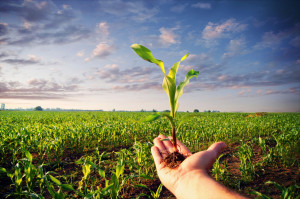
Simulation of Crop Productive Processes (founder – Anatolii Mykolaiovych Polovyi – Doctor of Science (Geography), Professor);
 Fundamental and Applied Research into the Boundary Geophysical Layer (founder – Wolf Abramovych Schnaidman – Doctor of Science (Physics and Mathematics), Professor and his colleagues: Anatoliy Grygorovych Tarnopolskiy – Doctor of Science (Geography), Professor, and Sergiy Mykolaiovych Stepanenko – Doctor of Science (Physics and Mathematics), Professor).
Fundamental and Applied Research into the Boundary Geophysical Layer (founder – Wolf Abramovych Schnaidman – Doctor of Science (Physics and Mathematics), Professor and his colleagues: Anatoliy Grygorovych Tarnopolskiy – Doctor of Science (Geography), Professor, and Sergiy Mykolaiovych Stepanenko – Doctor of Science (Physics and Mathematics), Professor).
Regional Oceanology. The founders of this school which was created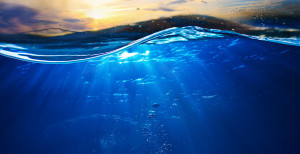 and evolves on the basis of the oceanology department are Viktorina Fyodorovna Sukhovei – Doctor of Science (Geography), Professor, Anatoliy Yerofeevich Filonov – Doctor of Science (Physics and Mathematics), Professor, and their colleague Yuriy Stepanovych Tuchkovenko – Doctor of Science (Geography), Professor.
and evolves on the basis of the oceanology department are Viktorina Fyodorovna Sukhovei – Doctor of Science (Geography), Professor, Anatoliy Yerofeevich Filonov – Doctor of Science (Physics and Mathematics), Professor, and their colleague Yuriy Stepanovych Tuchkovenko – Doctor of Science (Geography), Professor.
Amount of specialists involved in researches:
237 (215 faculty staff + 22 researchers)
Significant scientific-research projects:
- EU-Ukraine TACIS Project: «Lakes of the Lower Danube» (2002),
- «Warning of extraordinary situations and flood protective measures in the European Region of Lower Danube» (2006),
- «Technical assistance at planning of the basin management of the Lower Dnestr» (2006),
- «Forming of of the of Pan-European Ecological Network, Marine and Coastal Biodiversity and Protected Areas» (2006),
- NATO project ESP/NUKR.Ev 982416 “Hydrology of and Ecology of Steppe Rivers in Eastern Europe” (2006),
- NATO research grant ‘Science for Peace’ – Sfp 981044 “Extreme precipitation evens” (2004 – 2006),
- International project of “Cooperation in WRF and ALLADIN Modelling Systems” (2007),
- International research project “Nonlinear Non-Equilibrium Systems” under the joint EU and International fund of Human Capital and Mobility Program (2004-2005),
- NATO research grant ‘Science for Peace’ for implementation of the international project of “Climate Variability/Change and Health of the Black Sea’s Ecosystem”
- Network Environment Assessment and Remediation (NEAR)-3, a program of international cooperation between the universities of Central and Eastern Europe sponsored by a grant from the research fund of the government of Switzerland. (2007)
- FP7 – LAGOONS – Integrated water resources and coastal zone management in European lagoons in the context of climate change – LAGOONS (2011-2014)
- SEE TCP – OrientGate – network for the integration of climate knowledge into policy and planning – OrientGate, the South East Europe Transnational Cooperation Programme, INTRA – 5100828 (2012-2014)
- Black Sea Basin Programme – HOT BLACK SEA
Integrated hotspots management and saving the living Black Sea ecosystem – HOT BLACK SEA (2013-2015)
Significant scientific & innovative achievements in latest 10 years (Patents, Awards):
- Grand Prix of the International Exhibition ‘Hi-Tech Education’ (Odessa, Ukraine) – 2005, 2006, 2007, 2011.
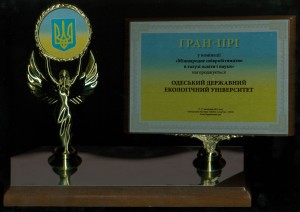 Grand Prix for Development of International Cooperation in the Field of Education and Science. International Exhibition ‘Education
Grand Prix for Development of International Cooperation in the Field of Education and Science. International Exhibition ‘Education 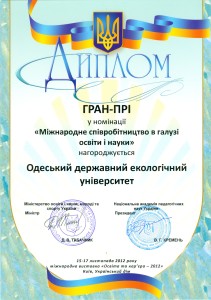 & Career – 2012’, Kyiv, 29-31 March 2012
& Career – 2012’, Kyiv, 29-31 March 2012- Grand Prix for Development of International Cooperation in the Field of Education and Science. International Exhibition ‘Education & Career – 2012’, Kyiv, 15-17 November 2012
- Honorary Sign and Diploma ‘The Leader of Scientific and Technical Activities’ and Diploma for Quality of Scientific Publications of the 4th International Exhibition ‘Modern Educational Establishments – 2013’, Kyiv, 28 February – 02 March 2013
- Grand Prix for Development of International Cooperation in the Field of Education and Science. International Exhibition ‘Education & Career – 2013’, Kyiv, 11-13 April 2013
- Grand Prix for Development of International Cooperation in the Field of Education and Science. International Exhibition ‘Education & Career – 2015’, Kyiv, 12-14 November 2015
- Grand Prix for Development of International Cooperation in the Field of Education and Science. International Exhibition ‘Education & Career – 2016’, Kyiv, 14-16 April 2016
- Grand Prix for Development of International Cooperation in the Field of Education and Science. International Exhibition ‘Education & Career – 2016’, Kyiv, 17-19 November 2016
- Diploma of the Laureate of the First Degree under the Nomination of “Innovation in Enhancement of International Cooperation in the Area of Education, Research and Culture” and a Diploma for
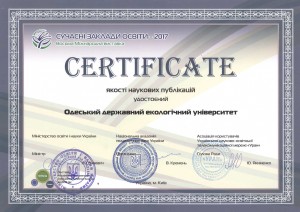 Taking an Active Part in Innovative
Taking an Active Part in Innovative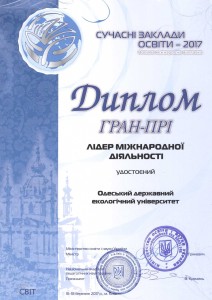 Educational Activities. 8th International Forum ‘Innovation in Modern Education’ and the 4th International Exhibition of Foreign Educational Institutions ‘Edu World’, Kyiv, 25-27 October 2016.
Educational Activities. 8th International Forum ‘Innovation in Modern Education’ and the 4th International Exhibition of Foreign Educational Institutions ‘Edu World’, Kyiv, 25-27 October 2016. - Grand Prix ‘Leader of the International Activity’ (honorary award and diploma), Certificate of the Quality of Scientific Publications and Diploma for active participation in establishment of modern high-quality national education system. 8th International Exhibition ‘Modern Educational Institutions – 2017’, Kyiv, 16-18 March 2017.
I. All-UNIVERSITY lABORATORIES
1.1. Geophysical Marine Research-and-Training Laboratory.
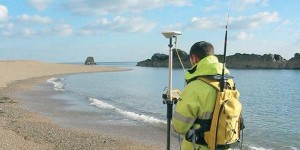 The laboratory is equipped with a complete complex of instruments and equipment, which provide practical work in the field for the undergraduate students, specialist and master degree students in the following specialities: ‘Oceanology’, ‘Hydrography’, ‘Hydroecology’, ‘Meteorology’, ‘Water Biological Resources’ (in the Mariculture section) and scientific research in the respective areas.
The laboratory is equipped with a complete complex of instruments and equipment, which provide practical work in the field for the undergraduate students, specialist and master degree students in the following specialities: ‘Oceanology’, ‘Hydrography’, ‘Hydroecology’, ‘Meteorology’, ‘Water Biological Resources’ (in the Mariculture section) and scientific research in the respective areas.
In particular, the list of instruments and equipment includes: a moor with a motor vessel, complexes of controlling and measuring instruments for marine environment conditions (hydrochemical indices of the water, wave phenomena, sea currents, flow velocity, volume, intensity, water temperature, depth measurement etc.). The laboratory is equipped with a meteorological instrument ground which provides full complex of meteorological observations of atmospheric conditions; devices, needed for assessment of biological conditions of the marine environment, the influence of sea waves on coastal condition, as well as the automated complexes for handling information, which determine the assignment of the laboratory equipment.
1.2. Meteorological Research-and-Training Laboratory.
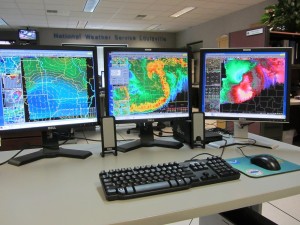 The Meteorological Research-and-Training Laboratory, above all things, provides studies and research for such specialities as ‘Meteorology’, ‘Agricultural meteorology’, ‘Radiometeorology and Radiolocation’. The laboratory is equipped with a number of meteorological instrument grounds which enable full complex of measurements of environmental conditions, in particular – parameters of the atmospheric air (wind speed and direction, atmospheric pressure, humidity, data on air temperature at various levels etc.), as well as agrometeorological data (soil temperature at various depths, humidity, physical indices of soil etc.). Experimental instrument grounds for conducting research into assessment of the influence of meteorological factors on various crops, are also situated in the territory of the laboratory. Agroclimate research is provided by a biotron.
The Meteorological Research-and-Training Laboratory, above all things, provides studies and research for such specialities as ‘Meteorology’, ‘Agricultural meteorology’, ‘Radiometeorology and Radiolocation’. The laboratory is equipped with a number of meteorological instrument grounds which enable full complex of measurements of environmental conditions, in particular – parameters of the atmospheric air (wind speed and direction, atmospheric pressure, humidity, data on air temperature at various levels etc.), as well as agrometeorological data (soil temperature at various depths, humidity, physical indices of soil etc.). Experimental instrument grounds for conducting research into assessment of the influence of meteorological factors on various crops, are also situated in the territory of the laboratory. Agroclimate research is provided by a biotron.
The work of radiometeorologists is enabled by the following laboratory equipment: radiometry devices for estimation of the state of the atmosphere at various altitudes, meteorological radars and cloud seeding facilities.
1.3. Fluvial Hydroecological Laboratory.
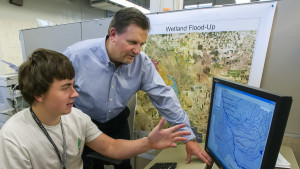 The main activity of the laboratory consists in provision of students’ training and research in ‘Hydrology and Hydrochemistry’, ‘Hydrography’, ‘Hydroecology’, ‘Water Bioresources and Aquiculture’. The laboratory is equipped with a full complex of instruments for implementation of the hydrometry in rivers, lakes, reservoirs (speed, level, temperature conditions, flow patterns, depth measurement, hydrochemical indices for pollution of surface and ground waters etc.). An automatic hydrological station (Certified by the Committee of Ukraine on Hydrometorology), a laboratory of hydrochemistry and a complex of equipment for estimation of biological productivity of objects are installed. The laboratory is equipped with a moor and a motor vessel, a meteorological instrument ground and a training ground for estimation of surface runoff formation and soil erosion.
The main activity of the laboratory consists in provision of students’ training and research in ‘Hydrology and Hydrochemistry’, ‘Hydrography’, ‘Hydroecology’, ‘Water Bioresources and Aquiculture’. The laboratory is equipped with a full complex of instruments for implementation of the hydrometry in rivers, lakes, reservoirs (speed, level, temperature conditions, flow patterns, depth measurement, hydrochemical indices for pollution of surface and ground waters etc.). An automatic hydrological station (Certified by the Committee of Ukraine on Hydrometorology), a laboratory of hydrochemistry and a complex of equipment for estimation of biological productivity of objects are installed. The laboratory is equipped with a moor and a motor vessel, a meteorological instrument ground and a training ground for estimation of surface runoff formation and soil erosion.
1.4. Training Laboratory of Technical Means for Teaching and Control
Provides training process with hardware for teaching at all stages of training. The equipment which enables training process in the interactive mode, multimedia facilities for presenting information and workstations comprise the inventory of the laboratory.
1.5. Laboratory of Quality Monitoring for Programmes of Study (Curriculua)
A complex of information technology equipment, which provides automated estimation of quality for training of specialists at various stages of the studies is introduced. The proper software has been developed.
1.6. Computation Center
Provides the studies and scientific research with proper computer facilities and peripheral equipment. 70 personal computers and sufficient number of printers, scanners and others kinds of peripheral units are connected to the local area network of the university and have the Internet access.
ІІ. THE HYDROMETEOROLOGICAL INSTITUTE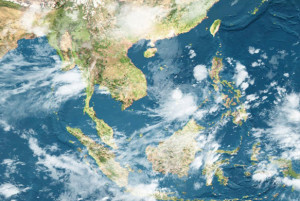
2.1. Training Laboratory for Analysis and Processing of Hydrometeorological Data.
2.2. Training Laboratory for Meteorological Observations.
2.3. Training Laboratory for Computation of Hydrological Information.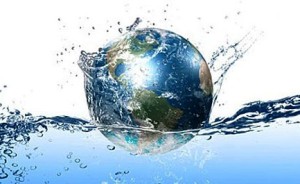
2.4. Training Laboratory for Reception of Hydrometeorological Information.
2.5. Training Bureau for Weather Forecasting.
2.6. Training Bureau for Hydrological Forecasting.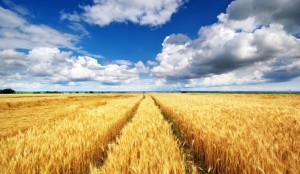
2.7. Training Laboratory of Agroclimatology.
2.8. Training Laboratory for Agroecosystem Productivity Modelling.
2.9. Training Laboratory of Soil Science.
All the abovementioned laboratories of the OSENU Hydrometeorological Institute are fully provided with up-to-date equipment and devices which are in present-day use of hydrometeorological services all over the world under conducting observations and measurements. The inventory includes: devices for measuring regime of the atmospheric air and water bodies (rivers, reservoirs, lakes, and ground waters), devices for agrometeorological and agroclimatological measurement, measuring devices for marine and hydrographical measurement. The whole list of the equipment and devices in the training laboratories of the Hydrometeorological Institute numbers more than 500 items.
In particular, ‘The Weather Forecaster’, ‘The Hydrologist’ and ‘The Agricultural Meteorology’ workstations and a meteorological satellite station have been employed in the academic process.
ІІІ. THE FACULTY OF Ecology, Environmental Protection and Sustainable Nature Management
3.1. Training Laboratory of Environmental Research.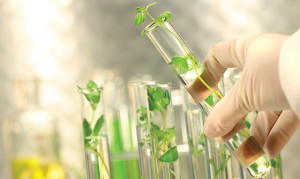
The laboratory is provided with modern devices and equipment, in particular: mini-express laboratories for conducting chemical analysis in the field, analyzers of oil-product content, the measuring devices for noise and vibration control, the measuring devices for strength of the field of industrial frequency, gamma-radiation energy spectrometers, including the ones for conducting field research, analytical systems of the ‘Ecotest-VA’ type for estimation of state of the environment, etc.
3.2. Training laboratory of Hydrometry, Hydraulics and River-Bed Processes.
The laboratory is provided with devices for conducting hydrometeorological instrumentation of all kinds of water objects: propeller flow meters, devices for measuring of water levels, runoff rate,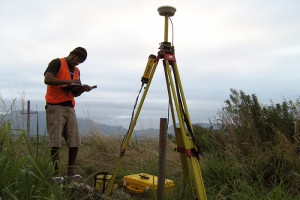 flow velocity, temperature and water hydrochemical indices, various types of sampling devices for estimation of alluvium flow, automated hydrometric measurement complexes of the GR type, hydraulic devices, test trays, up-to-date echo-sounding devices and navigators, etc.
flow velocity, temperature and water hydrochemical indices, various types of sampling devices for estimation of alluvium flow, automated hydrometric measurement complexes of the GR type, hydraulic devices, test trays, up-to-date echo-sounding devices and navigators, etc.
3.3. Training Laboratory of Geodesy and Geophysics.
The laboratory is equipped with geodesic and topographical devices – level gauges, theodolites, GPS devices, other instruments and equipment.
3.4. Training Laboratory of Water Bioresourses, Aquarium.
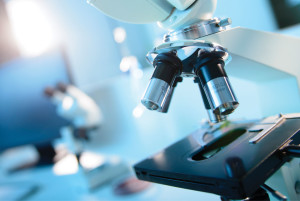 The laboratory is equipped with electronic microscopes, facilities for assessment of diseases of biological objects, conducting of biological analysis, the aquarium serves as the complement of the laboratory.
The laboratory is equipped with electronic microscopes, facilities for assessment of diseases of biological objects, conducting of biological analysis, the aquarium serves as the complement of the laboratory.
3.5. Training Laboratories of the Department of General and Theoretical Physics.
The laboratory is provided with standard physical equipment which makes it possible to conduct basic training of students in all fields and specialities at the University. A class of radiological and dosimetry devices to conduct assessment of contamination of the environment, including field sampling, constitutes a unit of the laboratory.
3.6. Training Laboratories of the Department of Chemistry of the Environment.
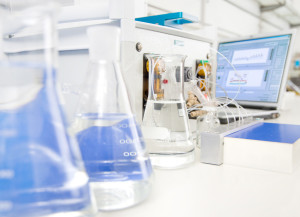 Training laboratories of the Department of Chemistry of the Environment are provided with a standard set of chemical equipment which provides proper training of students, with the requirements of the industries being taken into account. In particular, a class of personal computers works within the structure of the laboratories and training of students is carried out with the use of the up-to-date information technologies. The studies are provided with the specially developed and certified software systems. In the research laboratory of the Department of Chemistry of the Environment modern equipment, chromatographs and spectrometers are installed.
Training laboratories of the Department of Chemistry of the Environment are provided with a standard set of chemical equipment which provides proper training of students, with the requirements of the industries being taken into account. In particular, a class of personal computers works within the structure of the laboratories and training of students is carried out with the use of the up-to-date information technologies. The studies are provided with the specially developed and certified software systems. In the research laboratory of the Department of Chemistry of the Environment modern equipment, chromatographs and spectrometers are installed.
3.7. Training Laboratory for Physical Experiments.
The laboratory is provided with computer hardware, licensed program complexes, and standards of materials which make it possible to conduct modelling of various physical processes with the use of up-to-date information technologies.
IV. THE FACULTY OF ENVIRONMENTAL AND ECONOMIC SCIENCE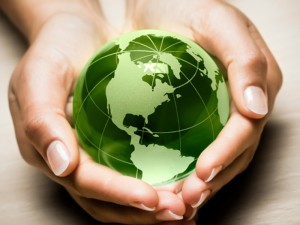
4.1. Training Laboratory of Information Systems of Management.
The laboratory is provided with personal computers, necessary peripheral units and licensed software.
4.2. Training laboratory of the Department of Environmental Law.
The laboratory is provided with personal computers, necessary peripheral facilities and licensed software. In particular, ‘the Environmentalist’ workstation certified by the Ministry of Environmental Protection of Ukraine is installed at the laboratory.
V. THE FACULTY OF COMPUTER SCIENCE
5.1. Training Laboratory of Informatics and Numerical Techniques.
Seven training classes of personal computers constitute the complement of the laboratory. The total rated display seating capacity makes 70 workstations. The laboratory is connected to the local area network of the University and has an Internet access.
5.2. Training Laboratory of the Automated Systems of Monitoring.
The laboratory is equipped with devices for organization of monitoring of environmental conditions – the meteorological stations, automated hydrological (gaging) stations, automated stations for control of contamination in the atmospheric air, automated complex for observation of hazardous weather phenomena (thunderstorms, hail, squalls, extreme precipitation, etc.) development.
5.3. Training Laboratory of Hydrometeorological Devices.
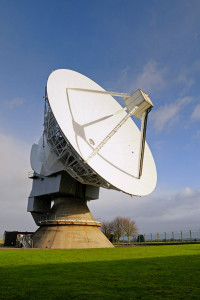 In the laboratory a wide spectrum of hydrometeorological devices which makes it possible to conduct observation of the state of various objects (the atmosphere and the soil, the superficial and subterranean water, the sea and the ocean) is presented.
In the laboratory a wide spectrum of hydrometeorological devices which makes it possible to conduct observation of the state of various objects (the atmosphere and the soil, the superficial and subterranean water, the sea and the ocean) is presented.
5.4. Training laboratory of Radar Meteorology and Meteorological Radar Equipment.
In the structure of the laboratory radar devices and equipment, which are in present-day use of the network of the Committee of Ukraine on Hydrometorology, cloud seeding and aircraft flight support facilities, are presented. For example, a set of the AMAS-1-1 automated meteorological station, which provides meteorological information for the departments of the Ministry of Transport and Communications of Ukraine in the fully automated mode and ‘The Observer Meteorologist’ workstation are installed in the laboratory.
At all the stages of training of specialists and carrying out research, alongside with various devices, instruments and equipment, computer hardware is widely used.
INTERNATIONAL ACADEMIC ACTIVITY
International academic projects and programmes participated by the institution
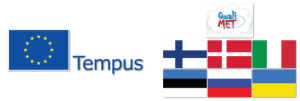 ‘Development of Qualification Framework in Meteorology’ (159352-TEMPUS-FI-TEMPUS-JPHES). The project consortium consists of the University of Helsinki (Finland), the University of Tartu (Estonia), the University of Copenhagen (Denmark), Russian State Hydrometeorological University (Saint Petersburg, Russia), Academic Association of the Russian Universities in the Area of Hydrometeorology (Russia), Roshydromet Advanced Training Institute (Moscow, Russia), non-profit organisation ‘Meteoagency of Roshydromet’ (Moscow, Russia), Tver State University (Russia).
‘Development of Qualification Framework in Meteorology’ (159352-TEMPUS-FI-TEMPUS-JPHES). The project consortium consists of the University of Helsinki (Finland), the University of Tartu (Estonia), the University of Copenhagen (Denmark), Russian State Hydrometeorological University (Saint Petersburg, Russia), Academic Association of the Russian Universities in the Area of Hydrometeorology (Russia), Roshydromet Advanced Training Institute (Moscow, Russia), non-profit organisation ‘Meteoagency of Roshydromet’ (Moscow, Russia), Tver State University (Russia).
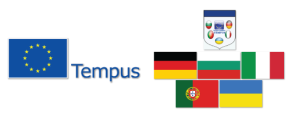 ‘EU Based Course in Foodstuff Expertise & Quality Control’ (159173-TEMPUS-1-2009-1-DE-TEMPUS-JPCR). The main participants of this project are: University of Applied Sciences Weihenstephan-Triesdorf (Germany) – Grant Applicant; University of Parma (Italy); Agricultural University – Plovdiv (Bulgaria); P&B – Association of Consultants (Portugal); Kharkiv State Zooveterinary Academy (Kharkiv, Ukraine); Dnipropetrovsk State Agrarian University (Dnipropetrovsk, Ukraine); Kherson State Agrarian University (Kherson, Ukraine); Odessa State Environmental University (Odessa, Ukraine); Ukrainian corporation of the industrial meat production (Kyiv, Ukraine); Ministry of Education and Science of Ukraine; Ministry of Agrarian Policy of Ukraine.
‘EU Based Course in Foodstuff Expertise & Quality Control’ (159173-TEMPUS-1-2009-1-DE-TEMPUS-JPCR). The main participants of this project are: University of Applied Sciences Weihenstephan-Triesdorf (Germany) – Grant Applicant; University of Parma (Italy); Agricultural University – Plovdiv (Bulgaria); P&B – Association of Consultants (Portugal); Kharkiv State Zooveterinary Academy (Kharkiv, Ukraine); Dnipropetrovsk State Agrarian University (Dnipropetrovsk, Ukraine); Kherson State Agrarian University (Kherson, Ukraine); Odessa State Environmental University (Odessa, Ukraine); Ukrainian corporation of the industrial meat production (Kyiv, Ukraine); Ministry of Education and Science of Ukraine; Ministry of Agrarian Policy of Ukraine.
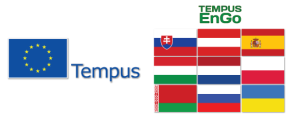 ‘Environmental Governance for Environmental Curricula’ (511390-TEMPUS-1-2010-1-SK-TEMPUS-JPCR). The project consortium consists of Comenius University in Bratislava (Slovakia), Central European University (Budapest, Hungary), IVAM (University of Amsterdam, Netherlands), Life Science University in Warsaw (Poland), Universitat Klagenfurt (Austria), Kharkiv National Academy of Municipal Economy (Ukraine), Belarusian State University, Central Research Institute for Complex Use of Water Resources (Minsk, Belarus), International A. Sakharov State Environmental University (Minsk, Belarus), Joint University of Belarus and Russia, Ecoproject (Minsk District, Belarus), Russian State Hydrometeorological University (St.-Petersburg, Russian Federation), Siberian Federal University (Krasnoyarsk, Russian Federation), Independent Environmental Chamber of Krasnoyarsk Kray, Pskov State Pedagogical University (Russian Federation), Institute of Ecology of the Carpathians (Lviv, Ukraine), MEDIAN S.C.P (Valldoreix, Spain)
‘Environmental Governance for Environmental Curricula’ (511390-TEMPUS-1-2010-1-SK-TEMPUS-JPCR). The project consortium consists of Comenius University in Bratislava (Slovakia), Central European University (Budapest, Hungary), IVAM (University of Amsterdam, Netherlands), Life Science University in Warsaw (Poland), Universitat Klagenfurt (Austria), Kharkiv National Academy of Municipal Economy (Ukraine), Belarusian State University, Central Research Institute for Complex Use of Water Resources (Minsk, Belarus), International A. Sakharov State Environmental University (Minsk, Belarus), Joint University of Belarus and Russia, Ecoproject (Minsk District, Belarus), Russian State Hydrometeorological University (St.-Petersburg, Russian Federation), Siberian Federal University (Krasnoyarsk, Russian Federation), Independent Environmental Chamber of Krasnoyarsk Kray, Pskov State Pedagogical University (Russian Federation), Institute of Ecology of the Carpathians (Lviv, Ukraine), MEDIAN S.C.P (Valldoreix, Spain)
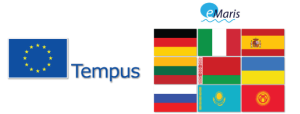 ‘Enhanced three-level competency-based curricula in Applied Marine Science’ (517271-TEMPUS-1-2011-1-DE-TEMPUS-JPCR). The project consortium involves the University of Bremen (Germany), Russian State Hydrometeorological University, St. Petersburg State Marine Technical University, P.P. Shirshov Institute of Oceanology, Immanuel Kant State University of Russia, Academic Association of RF Universities in Hydrometeorology (Russian Federation), Klaipeda University (Lithuania), University of Cadiz (Spain).
‘Enhanced three-level competency-based curricula in Applied Marine Science’ (517271-TEMPUS-1-2011-1-DE-TEMPUS-JPCR). The project consortium involves the University of Bremen (Germany), Russian State Hydrometeorological University, St. Petersburg State Marine Technical University, P.P. Shirshov Institute of Oceanology, Immanuel Kant State University of Russia, Academic Association of RF Universities in Hydrometeorology (Russian Federation), Klaipeda University (Lithuania), University of Cadiz (Spain).
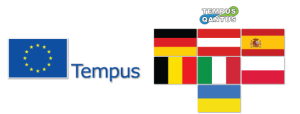 ‘Qualifications Frameworks for Environmental Science at Ukrainian Universities’ (544524-TEMPUS-1-2013-1-PL-TEMPUS-SMHES). Partners: Warsaw University of Life Sciences, Jagiellonian University (Poland), Odessa National Maritime Academy, Odessa State Environmental University, Kharkiv National University, National University of Life and Environmental Sciences of UA, Lviv National Agrarian University, Bila Tserkva National Agrarian University, Uman National University of Horticulture, Ministry of Education and Science of Ukraine, Science and Methodology Centre for Agricultural Education, Institute of Innovative Technologies and Educational Content, Institute of Ecology of the Carpathians NASU, State Department of Enviromental Protection in Odessa Region (Ukraine), University of Pavia, University of Genova (Italy), University of Natural Resources and Life Sciences (Vienna, Austria), University of Koblenz-Landau (Germany), University of Lleida (Spain), Association for European Life Science Universities, International Relations Officers’ Network of Assoc of ELSU (Belgium).
‘Qualifications Frameworks for Environmental Science at Ukrainian Universities’ (544524-TEMPUS-1-2013-1-PL-TEMPUS-SMHES). Partners: Warsaw University of Life Sciences, Jagiellonian University (Poland), Odessa National Maritime Academy, Odessa State Environmental University, Kharkiv National University, National University of Life and Environmental Sciences of UA, Lviv National Agrarian University, Bila Tserkva National Agrarian University, Uman National University of Horticulture, Ministry of Education and Science of Ukraine, Science and Methodology Centre for Agricultural Education, Institute of Innovative Technologies and Educational Content, Institute of Ecology of the Carpathians NASU, State Department of Enviromental Protection in Odessa Region (Ukraine), University of Pavia, University of Genova (Italy), University of Natural Resources and Life Sciences (Vienna, Austria), University of Koblenz-Landau (Germany), University of Lleida (Spain), Association for European Life Science Universities, International Relations Officers’ Network of Assoc of ELSU (Belgium).
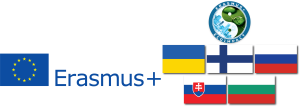 ‘Adaptive learning environment for competence in economic and societal impacts of local weather, air quality and climate’ (561975-EPP-1-2015-1-FI-EPPKA2-CBHE-JP), ERASMUS+ programme. Grant coordinator: University of Helsinki (Finland). Partners: Agricultural University – Plovdiv (Bulgaria), Stredoeuropska vysoka skola v Skalici (Slovakia), Kherson State Agricultural University, Odessa State Environmental University, Taras Shevchenko National University of Kyiv (Ukraine), Lobachevsky State University of Nizhny Novgorod, Russian State Hydrometeorological University, Advanced Training Institute (Zheleznodorozhny, Russian Federation).
‘Adaptive learning environment for competence in economic and societal impacts of local weather, air quality and climate’ (561975-EPP-1-2015-1-FI-EPPKA2-CBHE-JP), ERASMUS+ programme. Grant coordinator: University of Helsinki (Finland). Partners: Agricultural University – Plovdiv (Bulgaria), Stredoeuropska vysoka skola v Skalici (Slovakia), Kherson State Agricultural University, Odessa State Environmental University, Taras Shevchenko National University of Kyiv (Ukraine), Lobachevsky State University of Nizhny Novgorod, Russian State Hydrometeorological University, Advanced Training Institute (Zheleznodorozhny, Russian Federation).
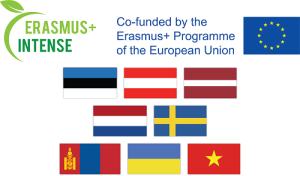 ‘Integrated Doctoral Program for Environmental Policy, Management and Technology – INTENSE’ (586471-EPP-1-2017-1-EE-EPPKA2-CBHE-JP), ERASMUS+ programme. Grant coordinator: Estonian Life Science University, Tartu, Estonia. Partners: University of Natural Resources and Life Sciences (Austria), Latvian National University (Riga, Latvia), Odessa State Environmental University, Kharkiv V.N.Karazin National University, Institute for the Carpathians’ Ecology of the Ukrainian Academy of Sciences (Ukraine), National University of Mongolia, Ulaanbaatar, Khovd University (Mongolia), Hanoi University of Science and Technology, Ho Chi Minh University of Natural Resources and Environment (Vietnam).
‘Integrated Doctoral Program for Environmental Policy, Management and Technology – INTENSE’ (586471-EPP-1-2017-1-EE-EPPKA2-CBHE-JP), ERASMUS+ programme. Grant coordinator: Estonian Life Science University, Tartu, Estonia. Partners: University of Natural Resources and Life Sciences (Austria), Latvian National University (Riga, Latvia), Odessa State Environmental University, Kharkiv V.N.Karazin National University, Institute for the Carpathians’ Ecology of the Ukrainian Academy of Sciences (Ukraine), National University of Mongolia, Ulaanbaatar, Khovd University (Mongolia), Hanoi University of Science and Technology, Ho Chi Minh University of Natural Resources and Environment (Vietnam).
‘Educational campaign Ecoligical TV’ project of the Netherlands Embassy.
Network Environment Assessment and Remediation (NEAR)-3, a program of international cooperation between the universities of Central and Eastern Europe sponsored by a grant from the research fund of the government of Switzerland (2005-2008). The project consortium consists of the University of Geneva, the Forel Institute (Switzerland), University of Bucharest (Romania), GeoEcoMar (Romania), Babes-Bolyai University of Cluj-Napoca (Romania), Institute of Oceanology (Bulgarian Academy of Sciences), Institute of Geology (Academy of Sciences of Georgia).
Educational program ‘NEAR 4 (Network Environment Assessment and Remediation)’, funded by the Switzerland Government. The project consortium consists of the University of Geneva, the Forel Institute (Switzerland), Kharkiv National University (Ukraine), St Andree University of Patriarchate of Georgia, Geology Institute of Azerbaijan, Moldova State University, GeoEcoMar (Romania), University of Bucharest (Romania), Babes-Bolyai University of Cluj-Napoca (Romania), Cracow University of Technology (Poland)
Collaboration in exchange of students, study of opportunities for students’ practical placement and conditions for finalizing diploma projects, exchange of academic staff and facilitating academic activities (with the New York State University, USA);
Development of bilateral collaborative projects in the field of Distance Learning (with the New York State University, USA)
INTERNATIONAL JOINT RESEARCH ACTIVITY
International research projects and programmes coordinated by or with the participation of OSENU
- EU-Ukraine TACIS Project: ‘Lakes of the Lower Danube’ (2002),
- ‘Warning of extraordinary situations and flood protective measures in the European Region of Lower Danube’ (2006),
- ‘Technical assistance at planning of the basin management of the Lower Dnestr’ (2006),
- ‘Forming of the of Pan-European Ecological Network, Marine and Coastal Biodiversity and Protected Areas’ (2006),
- NATO project ESP/NUKR.Ev 982416 ‘Hydrology of and Ecology of Steppe Rivers in Eastern Europe’ (2006),
- NATO research grant ‘Science for Peace’ – Sfp 981044 ‘Extreme precipitation evens’ (2004 – 2006),
- International project of ‘Cooperation in WRF and ALLADIN Modelling Systems’ (2007),
- International research project ‘Nonlinear Non-Equilibrium Systems’ under the joint EU and International fund of Human Capital and Mobility Program (2004-2005),
- NATO research grant ‘Science for Peace’ for implementation of the international project of ‘Climate Variability/Change and Health of the Black Sea’s Ecosystem’
- Implementation of the ‘Integrated water resources and coastal zone management in European lagoons in the context of climate change’ (LAGOONS) project, funded by the European Commission under the FP7 program (FP7-ENV-2011 call) within the section of ‘Lagoons in the context of climate change’, in the consortium of 8 countries (Portugal, Norway, Poland, Russia, Great Britain, Ukraine, Germany, Spain).
- Implementation of ‘A structured network for integration of climate knowledge into policy and territorial planning’, ORIENTGATE, 2012-2014, INTRA-5100828 project under EU South East Europe Transnational Cooperation Programme. Participants: universities, research institutes and centers, public authorities, municipalities and NGOs in Italy, Austria, Bulgaria, Greece, Hungary, Romania, Albania, Bosnia and Herzegovina, Croatia, Macedonia, Montenegro, Serbia.
- ‘Building, exploitation and maintenance of solar water heaters’ within the framework ‘Building local capacity for domestic solar heating, hot water and insulation for rural and remote areas in the EEC region’ project of WECF (2011 – 2014). Partners: WECF, CDE (Center for Development and Environment), GERES (Groupe Energies Renouvelables, Environnement et Solidarités); Georgia: The Greens Movement of Georgia, Rural Communities Development Agency, Social Development Center Akhaltsikhe, SEMA; Ukraine: Ecoclub Rivne, National Ecological Center of Ukraine, Vozrozhdenie Tatarbunary.
- CLG ‘Granular materials – protective functions’ NATO grant.
- Participation in the Ukrainian-Russian Federation Programme ‘Structure of the condensed matter 2011-2013’ (jointly with M.M. Bogolyubov Institute for theoretical physics of NAS of Ukraine and the Laboratory of nuclear physics of the Joint Institute for Nuclear Research, Dubna, Russia)
- ‘Astrophysical Energy-Balance Modelling the Earth’s Climate with Effect of Cosmic Rays’ International scientific project. Participants: British Antarctic Survey, Slovenian institute for nuclear research, Institute for nuclear research and nuclear energy, Bulgarian Academy of Science, Bulgaria, ‘Arctic and Antarctic Research Institute’ State Scientific Center of the Russian Federation, Taras Shevchenko Kyiv National University, the Ukrainian Antarctic Center.
- International project ‘Quantum theory Project’. Participants: University of Florida (USA), University of Athens (Greece), Democritos National Centre for Scientific Research (Greece), University of Uppsala (Sweden).
- Scientific project: ‘Application of the relativistic DFT theory in atomic calculations’; Participants: Democritos National Centre for Scientific Research, Institute of Material Science (Greece).
- Project: ‘GEOMATH’ Computer complex and micros-technology in hydrometeorological and ecological tasks. (2008-2014) Participants: University of Athens (Greece) and Szczecin University (Poland).
- ‘Integrated hotspots management and saving the living Black Sea ecosystem – HOT BLACK SEA’ Project (2013-2015) under the Joint Operational Program “Black Sea Basin 2007-2013”. Partners: National Institute for Research and Development in Electrical Engineering ICPE-CA (Bucharest, Romania) – The Project Coordinator, Foundation Caucasus Environment (Tbilisi, Georgia), TUBITAK Marmara Research Center (Gebze / KOCAELİ, Turkey), Burgas Municipality (Bulgaria), Odessa State Environmental University (Ukraine), Nongovernmental Organization for Sustainable Regional Development and Environmental Protection (SuRDEP, Varna, Bulgaria).
- Bilateral research projects with the partner-universities and organisations: University of Guadalajara (Mexico); Akaki Tsereteli State University (Georgia); Klaipeda University (Lithuania); Comenius University (Slovakia); Warsaw University of Life Sciences, University of Science and Technology in Bydgoszcz, Jagiellonian University (Poland); Central European University (Hungary); Potsdam Institute for Climate Impact Research, University of Bremen, University of Applied Sciences Weihenstephan – Triesdorf, University of Koblenz-Landau (Germany); Klagenfurt University, University of Natural Resources and Life Sciences, Vienna (Austria); Vrije Universiteit, Amsterdam (Netherlands); Norwegian Institute for Agricultural and Environmental Research – Bioforsk; University of Murcia, University of Lleida (Spain); University of Aveiro, Paulo & Beatriz – Consultores Associados, Lda (Portugal), University of Dundee, Scotland (UK); Moscow State University, Russian State Hydrometeorological University, Irkutsk State Agricultural Academy (Russian Federation), Siberian Federal University (Krasnoyarsk, Russian Federation), Russian Research Institute of Agricultural Meteorology, Russian Research Hydrometeorological Centre, Research Centre for Remote Sensing of the Atmosphere, Ufa State Aviation Technical University, I.G. Petrovsky Briansk State University (Russian Federation), Atlantic Branch of the Shirshov Institute of Oceanology (Russian Academy of Science), ‘Sevkavgiprovodkhoz’ Company (Piatigorsk, Russian Federation), the Centre for Radioecological Researches (Russian Academy of Science); Belarusian State University, Belarusian State Agricultural Academy, Belarusian-Russian University, Central Research Institute for Complex Use of Water Resources (Belarus), Institute of Ecology and Geography (Academy of Science of Moldova), University of Geneva (Switzerland), Agricultural University – Plovdiv, Technical University of Gabrovo (Bulgaria), Institute of Oceanology (Bulgarian Academy of Science); University of Helsinki (Finland); Asia Pacific Applied Science Associates (Australia); University of Liège, Association for European Life Science Universities, International Relations Officers’ Network of Assoc of ELSU (Belgium); Technological University of Lulea (Sweden); University of Setif (Algeria); University of Messina, University of Parma, University of Pavia, University of Genova (Italy); Democritos National Centre for Scientific Research, Institute of Material Science (Greece); National Institute of Marine Geology and Geoecology – GEOECOMAR (Romania).
PROPOSALS FOR COOPERATIVE PROGRAMS
Regional Academic Programs
- Adjusting the syllabi and curricula to meet the real labour market demands and conditions,
- Developing multilateral collaborative projects in the field of Distance Learning,
- Developing awareness of necessity for institutional development and search for non-academic partners,
- Strengthening of the University significance as a center of scientific research and business consultancy,
- Building up university entrepreneurial abilities,
- Looking for new markets for educational activities,
- Bringing about the management of change,
- Making the University a centre for holding regional and international seminars, conferences and business trainings via implementation of the University strategic plans, projects and programmes.
COOPERATIVE RESEARCH PROGRAMS
Elaboration of all kinds of multilateral collaborative research activities in line with the development of current research branches of the University
Mobility Programs for Academics & Students
- Quality support measures for students and academic staff
- Enhancement of international cooperation capacities
- Academic recognition of study periods abroad
- Transparent selection mechanisms
- Visibility and communication strategy
586471-EPP-1-2017-1-EE-EPPKA2-CBHE-JP
Project web-sites: http://intense.network/ , http://dl.intense.network/
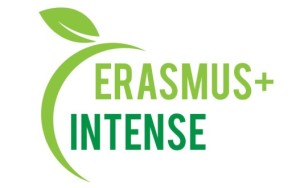
561975-EPP-1-2015-1-FI-EPPKA2-CBHE-JP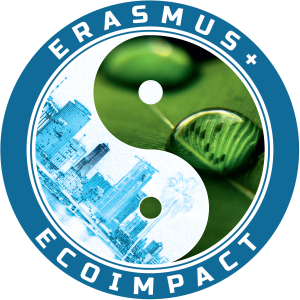
Project web-sites: http://www.atm.helsinki.fi/ecoimpact/ , http://e-impact.net/en/ ,
http://osenu.e-impact.net/ , http://ksau.e-impact.net/
159173-TEMPUS-1-2009-1-DE-TEMPUS-JPCR:
511390-TEMPUS-1-2010-1-SK-TEMPUS-JPCR:
Environmental Governance for Environmental Curricula – DL source
517271-TEMPUS-1-2011-1-DE-TEMPUS-JPCR:
544524-TEMPUS-1-2013-1-PL-TEMPUS-SMHES:
European Climate Adaptation Platform
Black Sea Basin Programme – HOT BLACK SEA: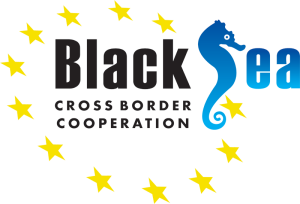
FP7 – LAGOONS:
Alliance of Universities for Democracy (AUDEM)
Svitlana Shmeliova, PhD,
Member of the Board of Directors of the Alliance of Universities for Democracy (AUDEM)
Tel./fax +38 056 370 37 94, mobile +38 097 503 96 67
e-mail: depwr@a-teleport.com, svitlana.shmelova@gmail.com
Black Sea Universities Network (BSUN),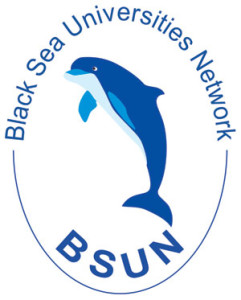
http://www.bsun.org/ , 124 Mariana Av., Constanza, ROMANIA.
Tel. / fax: +40 241 614 983, mobile: + 40 748 142 615
e-mail: bsun@univ-ovidius.ro
Euroasian Universities Association (EAU),
Lomonosov Moscow State University, B-126, GSP-2,
Leninskie Gory, Moscow, 119991, Russian Federation
Tel./fax + 7 495 939 27 69
e-mail: eau_msu@rector.msu.ru, eau_msu@mail.ru
Odessa State Environmental University
Mailing address: 15 Lvivska Str., Odessa, 65016, Ukraine
Phone: + 38 0482 326 735, + 38 0482 326 764, + 38 0482 326 757
Fax: +38 0482 326 764
Internet home page: http://odeku.edu.ua/
RECTOR
Sergiy Stepanenko, Doctor of Science (Physics and Mathematics), Professor
E-mail: rector@odeku.edu.ua
Phone: + 38 0482 326 735
DEPARTMENT OF FOREIGN RELATIONS
Head: Oleg Shabliy
E-mail: foreign-relation@odeku.edu.ua;
foreign-relations@osenu.org.ua
Phone: +38 048 785 2720
DEAN’S OFFICE FOR THE WORK WITH FOREIGN STUDENTS
Head: Olena Vladymyrova
E-mail: dean-dis@odeku.edu.ua, foreign1@odeku.edu.ua, foreign3@odeku.edu.ua
Phone: +38 048 785 2715, +38 0482 425718, +38 0482 427 764
Participation of OSENU in EU International Projects
Video Spots from UNO Agencies
UN Environment – UNEP
Did you added your own Google API key? Look at the help.
Check in YouTube if the id UnepAndYou belongs to a username. Check the FAQ of the plugin or send error messages to support.
World Meteorological Organization – WMO
Did you added your own Google API key? Look at the help.
Check in YouTube if the id wmovideomaster belongs to a username. Check the FAQ of the plugin or send error messages to support.
Food and Agriculture Organization of the United Nations – FAO
Did you added your own Google API key? Look at the help.
Check in YouTube if the id FAOoftheUN belongs to a username. Check the FAQ of the plugin or send error messages to support.
